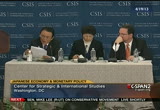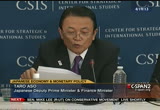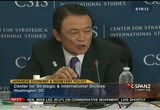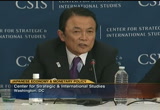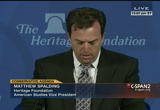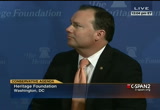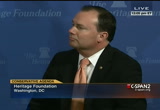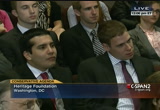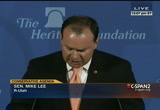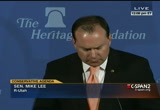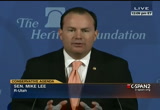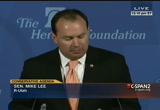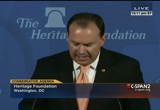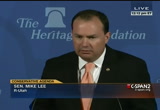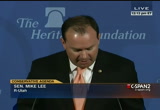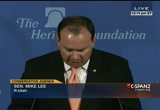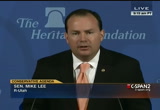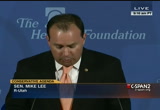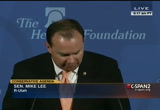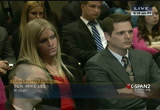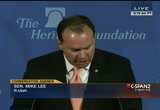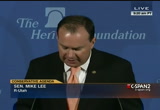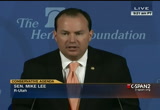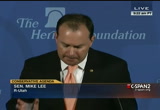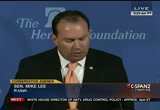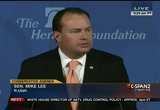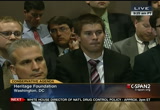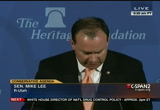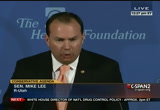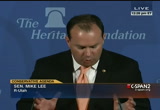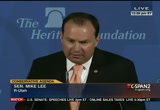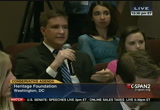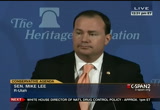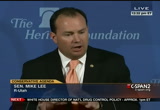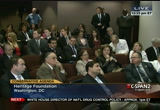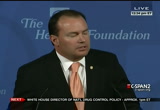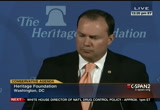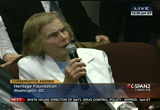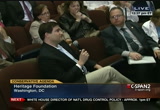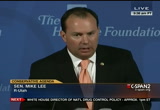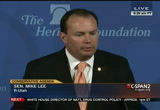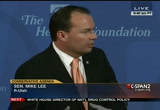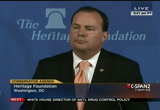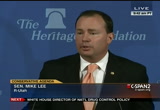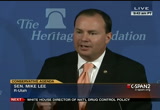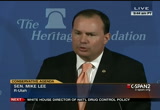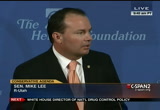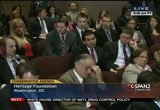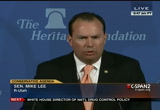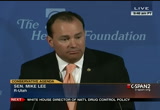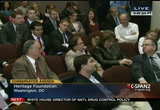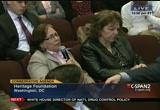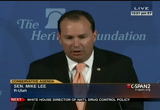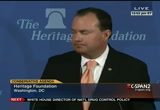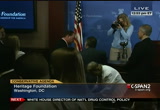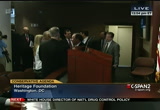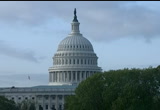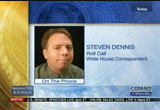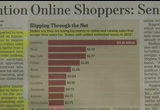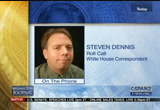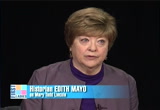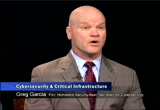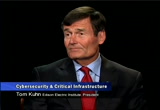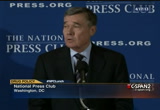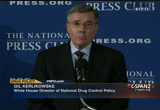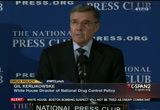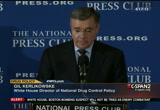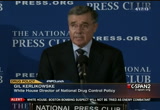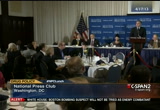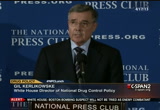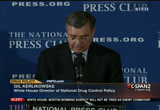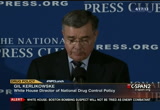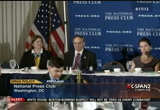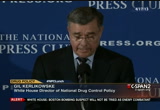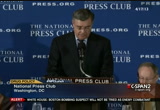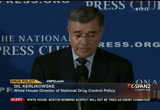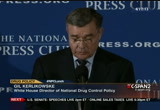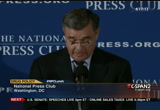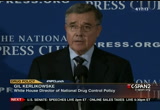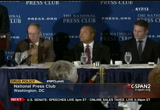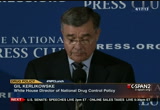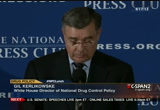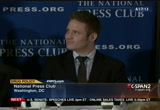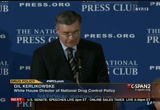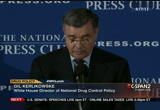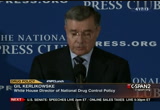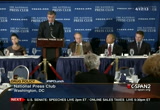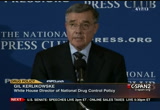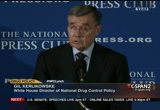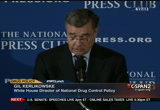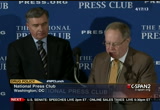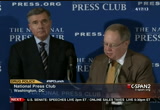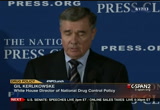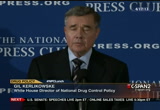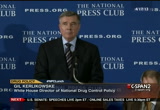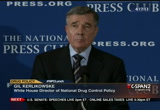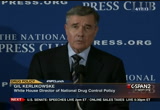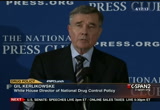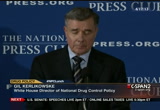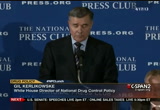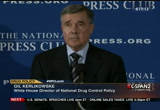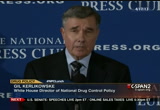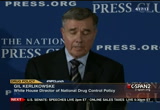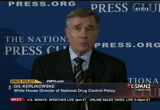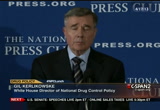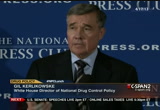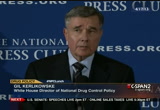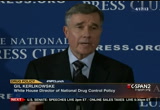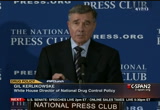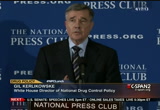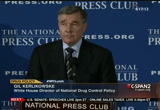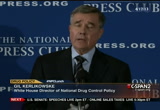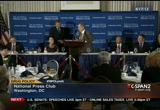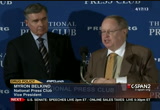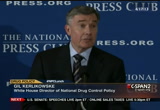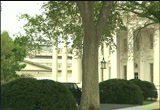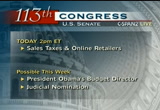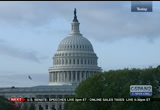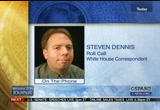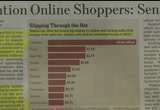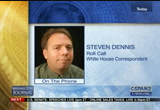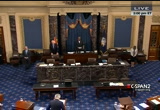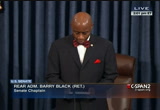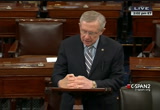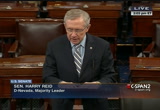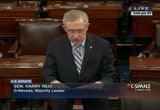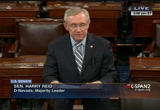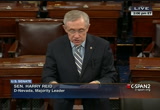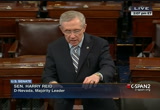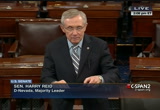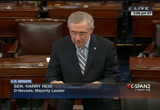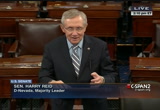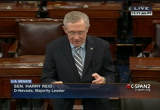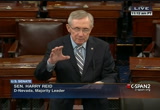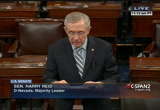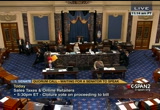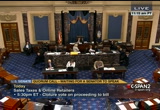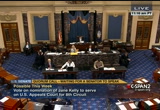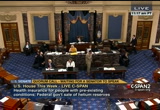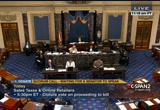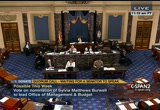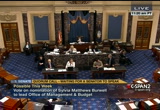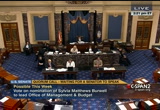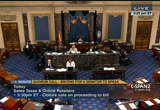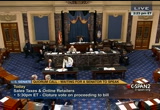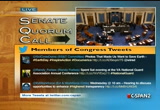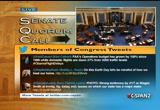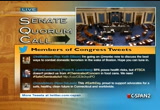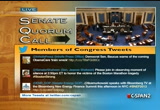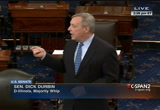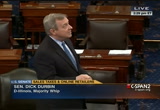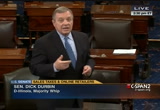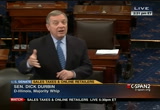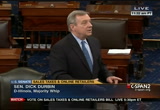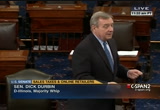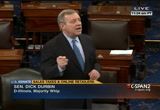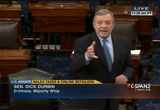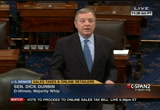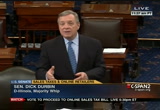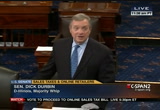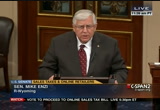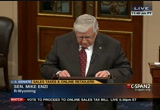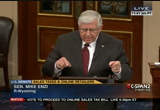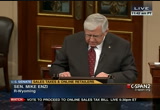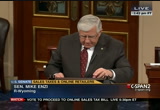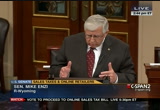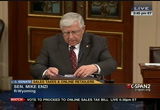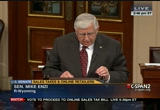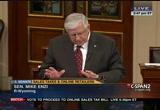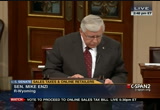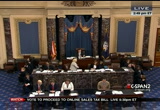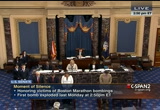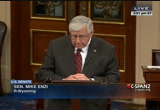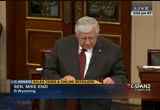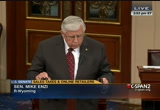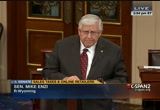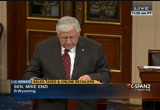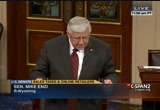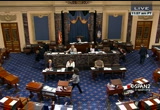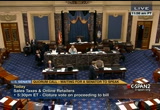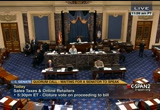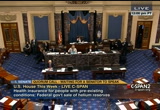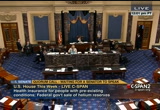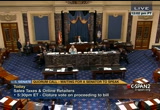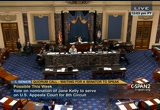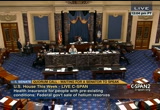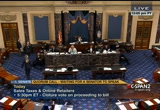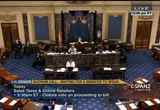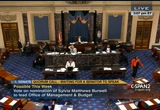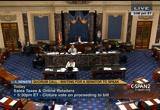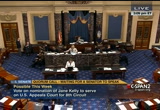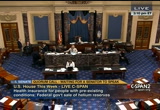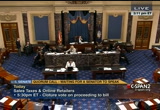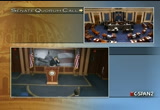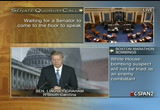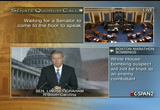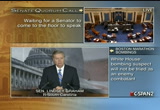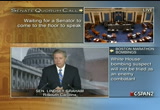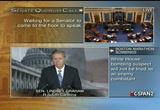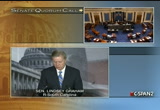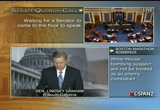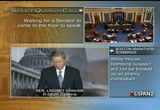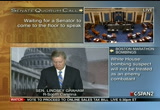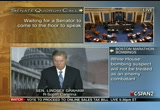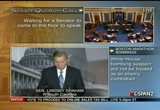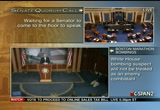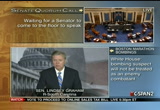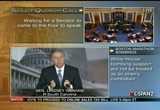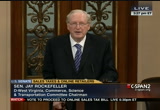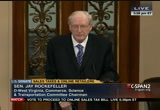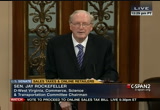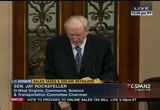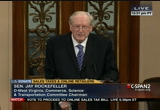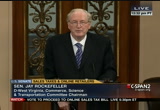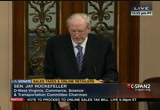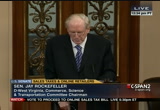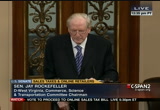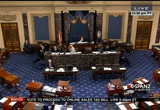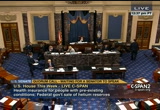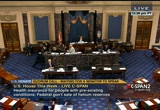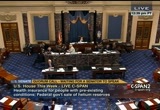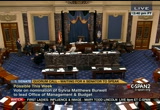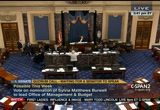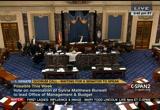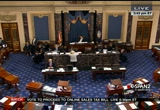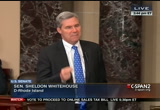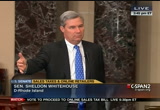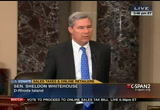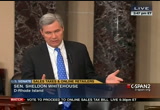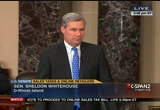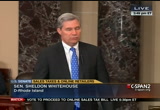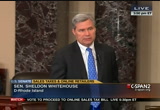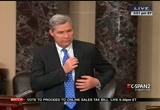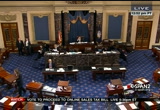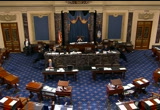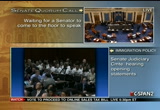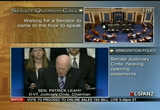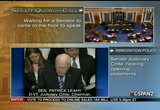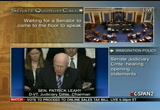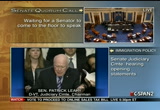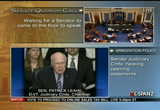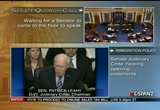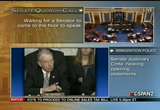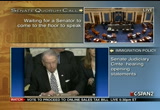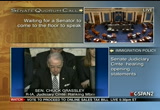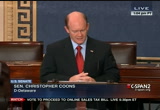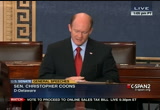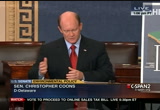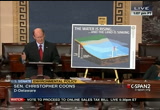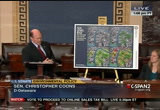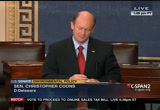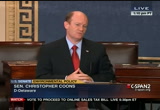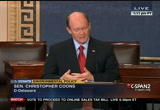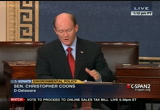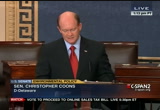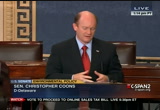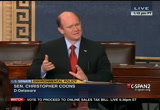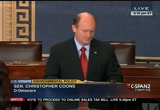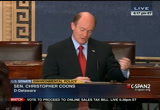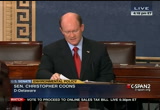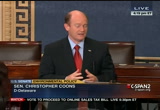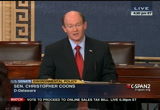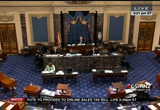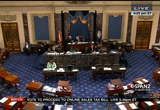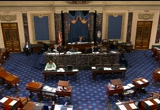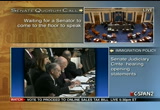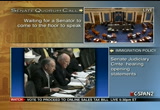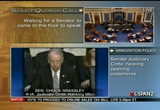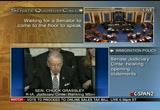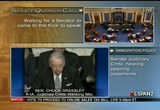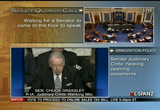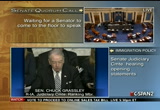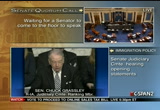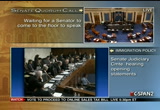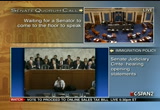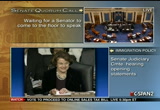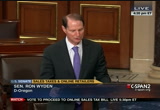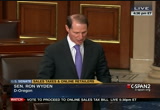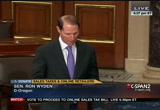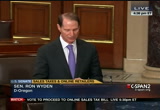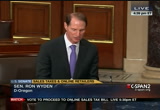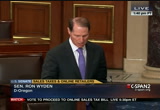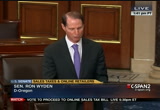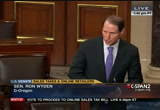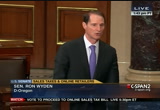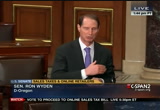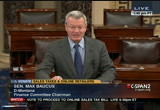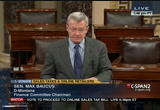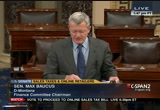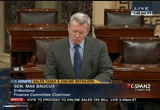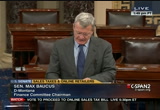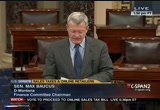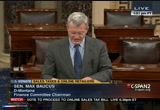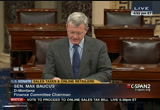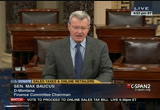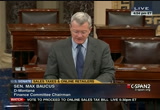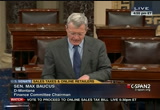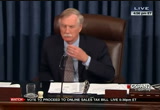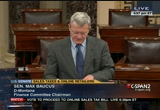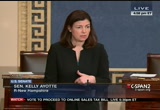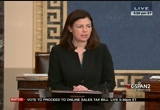tv U.S. Senate CSPAN April 22, 2013 12:00pm-5:01pm EDT
12:00 pm
action are required to make growth strong, sustainable and balanced. some countries have taken steps to stimulate activities since we last met in moscow, last met. in particular japan's recent policy actions are intended to stop deflation and support domestic demand. [speaking japanese] ght i think the portions that i have just read out to you corresponds to the answer which may answer your question which
12:01 pm
might have contained some doubts about -- [inaudible] >> arthur? >> thank you. i'm arthur alexander, i teach japan economy at georgetown. you're making the summit interesting again. the interesting problems that you face, and i d not envy you, is you said the fits call consolidation, the consumption tax will go up next year and the following year, and you're certainly aware that will take a big hit on consumption on income that will have a negative impact on the economy, and i'm wondering how you're balancing these two different issues of fiscal consolidation and demand. [speaking japanese]
12:02 pm
>> translator: i think you have hit on the most important point, because whenever we may try to increase the taxes, it does not necessarily result in increasing the tax revenue. we have known the actual examples which have happened in the past in many nrsakg ne >> you can watch the rest of this online as we take you live now to the heritage foundation in washington, d.c. for remarks by senator mike lee of utah. he'll be talking about the conservative movement and the future of the republican party.
12:03 pm
>> in his most recent book, "we still hold these truths: rediscovering our principles, reclaiming our future." please join me in welcoming matt spalding. matt? [applause] >> thanks, jon. i thought you said constitutional squalor. did you -- [laughter] after elections, especially like those in 2012, it's very natural to debate what happened. looking at causes, solutions, tactics and strategy. indeed, it would be odd, especially with conservatives, not to debate those kinds of things. one popular argument is to adjust to changing times to focus on alternative versions of the status quo rather than changing directions. to change policies and sometimes principles, to adapt to new political environments. another approach, one that we favor, is to lay out a better
12:04 pm
and clearer conservative vision of american society. the role of government, unlimited opportunity, of political self-government. rather than new principles, what we need are better arguments. and when you take those arguments -- we need to take those arguments to the american people. it is in that spirit that we welcome today's speaker to heritageouat mike lee is in th third year of his first term. that means more terms to follow. the first -- the third year of his first term as united states senator from the state of utah. his background is in the law and, actually, he began his background in law at his family's kitchen table. his father, rex lee, was a law school dean, assistant u.s. attorney general and solicitor general for ronald reagan. senator lee is a graduate of brigham young university and byu law school, was a law clerk for judge dean benson of the u.s. district court of the district of utah and then judge sam
12:05 pm
alito's clerk when he was at the u.s. court of appeals for the 3rd circuit. he served as an attorney -- assistant u.s. attorney general in utah and general counsel to the governor of utah before turning to private practice. and then in 2010, that important election year, he decided to run united yorking out an -- knocking out an incumbent u.s. senator and a party-endorsed candidate to become the primary candidate and win the general election. senator lee is now on the judiciary committee, serves as ranking member of the antitrust competition policy and consumer rights subcommittee. he also sevens on the armed service -- serves on the armed services committee and the joint economic committee and is the top republican on the water and power subcommittee of the energy and natural resources committee. looking at great individuals influencing american history, i hope that we will have once again an opportunity to say as richard henry lee says in the music call 17776, here a lee,
12:06 pm
there a lee, everywhere a lee. [laughter] please join me in welcoming mike lee. [applause] >> thank you very much, matt. i want to offer my best wishes to all here at the heritage foundation as or it embarks on what is really an exciting new era. i also want to make clear that i spent much of the first year that i served in the united states senate joking or perhaps half joking that jim demint should run for president. this isn't exactly what i had in mind. [laughter] perhaps he misunderstood me. you know, the ting that makes jim -- the thing that makes jim demint a great leader is the same thing that has always made people like matt spaulding and the heritage foundation itself so valuable; that is, your shared insistence on making the positive case on conservativism,
12:07 pm
what conservatives are for. in washington it's common for both parties to succumb to easy negativity. republicans and democrats stand opposed to each other, obviously, in outspoken partisanship is what almost always gets the most headlines. this negativity is unappealing on both sides, and that helps explain why the federal government is increasingly held in such low regard by the american people. but for the left the defensive crouch at least makes sense. liberalism's main purpose today is to defend its past gains from conservative reform. but negativity on the right, to my mind, makes no sense at all. the left has created this false narrative that liberals are for things, and conservatives are against things. when we concede this narrative even just implicitly, we concede the debate before that debate even begins. and yet too many of us, elected
12:08 pm
conservatives especially, do it anyway. we take the bait. a liberal proposes an idea, we explain why it won't work, and we think we've won the debate at that moment. but even if we do, we reinforce at ivat i'm talking about; winning battles while we're losing the war at every step. this must be frustrating to the scholars of the heritage foundation who work every day producing new ideas, ideas about what conservatives can be for. but it should be even more frustrating to the conservatives around the country that we as elected conservatives were, in fact, elected to serve. after all, they know what they're for, so why don't we? perhaps it's because it's so easy in washington to forget. in washington we debate public policy so persistently, we can lose sight of the fact that policies are means, and they're
12:09 pm
not ends. we say that we're for lower taxes or less regulation or for spending restraint. but those are just policies we advocate. they're not what we're really for. what we're really for are the good things that those policies will yield to the american people. what we're really for is the kind of society that those policies would allow the american people to create. together. together. if there's one idea too often missing from our public dedaylight, it's that idea: together. in the last few years we conservatives seem to have abandoned words like "together," "compassion" and "community," as if they're only possible meetings or some kind of a secret code for statism. this is a mistake. collective action doesn't only or even usually mean government action. conservatives cannot surrender
12:10 pm
the idea of community to the left. when it is the vitality of our communities upon which our entire philosophy ultimately depends. nor can we allow one politician's occasional conflation of compassion and bier government to discourage us from etch sizing the moral -- emphasizing the moral code of our world view. conservativism, ultimately, is not about the bills we want to pass. it is about the kind of nation we want to be. if conservatives want the american people to support our agenda for the government, we have to do a better job showing them our vision for society and reconnecting our agenda to it, to that vision. we need to remind the american people and perhaps, too, the republican party itself that the true and p proper end of political subsidiarity is social solidarity. ours has never been a vision of
12:11 pm
isolated, atomized loners. it is, instead, a vision of husbands and wyomings, parents and children, volunteers and congregations, bosses and employees, businesses and customers, clubs, teams, groups, associations and friends. the essence sense of human freedom, of civilization itself is cooperation. this is something conservatives should celebrate. it's what conservativism is all about. freedom doesn't mean you're on your own. it means we're all in this together. our vision of american freedom is of two separate but mutually reinforcing institutions; a free enterprise economy and voluntary civil society. history has shown both of these organic systems to be extremely efficient at delivering goods and services. but these two systems are not good because they work. they work because they are good.
12:12 pm
together they work for everyone because they impel everyone to work together. they harness individuals' self-interest to the common good for the rest of the community and, ultimately, the nation. they work because in a free market economy and voluntary etever ur career or your cause, your success depends on your service. the only way to look out for yourself is to look out for those around you. the only way to get ahead is to help other people do the same. what exactly are all those supposedly cutthroat, exploitive businessmen and women competing for? well, to figure out the best way to help the most people. that's what the free market does. it rewards people for putting their god given talents and their own exertions out in the service of their neighbors. whatever money today earn is the wealth -- they earn is the
12:13 pm
wealth they create, value that they add to other people's lives. no matter who you are or what you're after, the first question anyone in a free market must ask him or herself is how can i help. what problems need to be solved. what can i do to improve other people's lives. the free market does not allow anyone to take. it impels everyone to give. the same process works inur voluntary civil society. conservatives' commitment to civil society begins, of course, with the family and the paramount, indispensable institution of marriage. but it doesn't end there. just as individuals depend on free enterprise to protect them from economic oppression, families depend on mediating institutions to protect them from social isolation. that is where the social entrepreneurs of our civil society come in. just like for-profit businesses, nonprofit, religious, civic,
12:14 pm
cultural and charitable institutions also succeed only to the extent that they serve the needs of the community around them. forced to compete for voluntary donations, the most successful mediating institutions in a free civil society are at least as innovative and efficient as profitable companies. if someone wants to make the world a better place, a free cil soety reires that he or she do el social entrepreneurs know that only the best soup kitchens and the best community theater companies and the best youth soccer leagues and, for that matter, the very best conservative think tanks will view vief. survive. so they serve. they serve their donors by spending their resources wisely, they serve tear communities by making them better places to live, and they serve their beneficiaries by meeting these together better than they can meet them acting alone. freedom doesn't divide us. big government does.
12:15 pm
it's big government, after all, that turns citizens into supplicants, capitalists into cronies and cooperative communities into competing special interests. freedom, by contrast, unites us. it pulls us together, and it aligns our interests. it draws us out of ourselves and into the lives of our friends, neighbors and even perfect it draws us upward toward th be. the free marketnd society are not things more americans need protection from. they are things more americans need access to. liberals scoff at all of this. they attack free enterprise as a failed theory that privileges the rich, exploits the poor and threatens the middle class. but our own history proves exactly the opposite. free enterprise is the only economic system that does not privilege the rich. instead, it incentivizes them to put their wealth to productive
12:16 pm
use serving other people or, eventually, lose it all. free enterprise is the greatest weapon against poverty ever conceived by man. let me ask, if the free market exploits the poor, how do liberals explain how the richest nation be human history -- nation in human history and its citins descended mostly from um grantsho originally came th nothing, r does free enterprise threaten the middle as free enterprise is what created the middle class in the first place. the free market created the wealth that liberated millions of american families from sub since farming -- subsistence farming, opening up opportunities for the pursuit of happiness never known before or since in government-directed economies. progressives are equally dismissive of our voluntary civil society. they simply do not trust free individuals and organic communities to look out for each other or solve problems without supervision. they think only government, only
12:17 pm
they possess the moral enlightenment necessary to do that. to be blunt, elite progressives in washington don't really believe in communities at all. no, they believe in community organizers. self-anointed strangers, preferably ones with ivy league degrees, fashionable, ideological grievances and a political agda toredrs those grievances. for progressives believe the only valid purpose of community is to accomplish the agenda of the state. but we know from our own lives that the true purpose of our communities is, instead, to accomplish everything else. to enliven our days, to ennoble our children, to strengthen our family, to unite our neighborhoods, to pursue our happiness and protect our freedom to do so. this vision of america conservatives seek is not an ayn rand novel. no, it's a norman rockwell painting or a frank capra movie.
12:18 pm
a society of plain, ordinary kindness and a looking out, a little looking out for the other fellow too. the great obstacle to realizing this vision today is government dysfunction. this is where our vision must inform our agenda. what reforms will make it easier for entrepreneurs to start new businesses, for young couples to get married and start new families and for individuals everywhere to come together to bring to life flouris new rtnerships and counit suld gove? and just as important, what should government not do to allow the free market to create new economic opportunity and to allow civil society to create new social capital? we conservatives are not against government. the free market and civil society depend on a just, transparent and accountable government to enforce the rule of law. what we're against are two
12:19 pm
pervasive problems that grow on government like mold on otherwise perfectly good bread. co andnefficiency. is important, it is important to note that government corruption and inefficiency are what stand today between the american people and the economy and society. that they deserve. to combat those pathologies, a new conservative reform agenda should center around three basic principles; equality, diversity and sustainability. let me explain. the first and most important of these principles is equality. the only way for the free market in a civil society to function, to tie perm success to interpersonal service, to align the interests of the strong and those of the weak is to have everyone play by the same set of rules. define this principle as how our government has always corrupted
12:20 pm
itself, our free market and our civil society. in the past the problem was political discrimination that held the disconnected down. today government specialty is dispensing political privileges to prop the well connected up. in either case the corruption is the same. official inequality, twisting the law to deem some people more equal than others, making it harder for some to succeed even when they serve and harder for others to fail even when today don't. even when they don't. and so we have corporate welfare. big businesses receiving direct and indirect subsidies that smaller companies don't receive. we have up -- uncivil society, politicians funding well connected nonprofit institutions based on political favoritism rather than merit. we have venture socialism, politicians funneling taxpayer money to politically correct businesses tt attract
12:21 pm
real investors. we have regulatory capture, industry leaders influencing the rules governing their sectors to protect their interests in hamstringing innovative challengers. the first step in a true conservative reform agenda must be to end this kind of preferential policy making beyond simply being the right thing to do. it's a prerequisite for earning the moral authority and the political credibility necessary to do anything else. why should the american people trust our ideas about middle class entitlements when we're still p propping up big banks? why should they trust us to fix the tax code when we use tear tax dollars to create artificial markets for uncompetitive tries? why should they trust our vision of a free civil society when we give special privileges to supposed nonprofits like planned parenthood, public broadcasting,
12:22 pm
agricultural check-off programs and the export--import bank? and perhaps most important, why should americans trust us at all when too often we don't really trust them? when we vote for major legislation negotiated in the secret without debating it and without even reading it, deliberately excluding the american people from their owng? to conservatives, equality needs to mean equality for even. for eryone. the second principle to guide our agenda is diversity or, as you might have heard it calls elsewhere, federalism. the biggest reason the federal government makes too many mistakes is that it makes too many decisions. most of these are decisions the federal government doesn't have to make and, therefore, shouldn't. every state in the union has a functioning constitutional government. and just as important, each state has a unique political and cultural history with unique traditions, values and
12:23 pm
priorities. progressives today are fundamentally intolerant of this kind of diversity. they insist on imposing their values on everyone. to them, the 50 states are just another so-called community to be organized, brought to heel by their betters in washington d.c. this flies in the face of the founders and of the constitution, of cours but it also flies in th face of common sense and experience. the usurpation of state authority is why our national politics has become so dysfunctional and so intolerably rancorous. we expect one institution, the federal government, to set policies that govern the lives of 300 million people spread across an entire continent. of course, it's going to get it right most of time. that's why successful organizations in the free market and civil society are moving in the opposite direction. well, if government
12:24 pm
consolidates, businesses dell date and decentralize while washington insists that it knows everything, effective organizations increasingly rely on diffuse social networks and customizable problem solving. we should not be surprised at all that washington has assumed greater control over transportation, education, labor, welfare, health care, banking and so much else. all of those increasingly centralized systems ar failing at ectly t same t conservatives should seize the opportunity not to impose our ideas on these systems, but to crowd source the solutions to the states. let the unique perspectives and values of each state craft craft its own policies and see what works and see what doesn't work. if vermont's pursuit of happiness leads it and its people to want more government and utah's less, then who are politicians from the other 48 states to tell them they can't
12:25 pm
have it? would we tolerate this kind of official intolerance in any other part of american life? a pew study just last week found that americans trust their state governments twice as much as the federal government, and their local governments even more. this shouldn't be a surprise. it should be a hint. state and local governments are more responsive, representative and accountable than washington d.c. wll.time toke them more as in the past conservatives given federal power have been tempted to overuse it. we must resist that temptation. if we want to be a diverse movement, we must be a tolerant movement. the price of allowing conservative states to be conservative is allowing liberal states to be liberal. call it subsidiarity, call it federalism, call it constitutionalism. but we must make this fundamental principle of
12:26 pm
pluralistic diversity a pillar of our agenda. and that brings us to our third guiding principle. once we eliminate policy privilege and restore political and policy diversity, we can start unsuring policy sustainability. insuring policy sustain about. once the federal government stops doing the things that it shouldn'castart dthe things thau better. that means national defense and intelligence, federal law enforcement and the courts, immigration, intellectual property and even the senior entitlement programs whose fiscal outlook threatens our future solvency and very survival. once we clear unessential policies from the books, federal politicians will no longer be able to hide from the public or from their constitutional responsibilities and limitations. congress will be forced to work together to reform the problems government has created in our health care system. we can fundamentally reform and modernize our regulatory system. we'll be forced to rescue our
12:27 pm
senior entitlement programs from bankruptcy. and we can reform our tax system to eliminate the corporate code's bias in favor of pig businesses over -- big businesses over small businesses and the individual code's bias against saving, investing and especially against our parents, our ultimate investor class. that is how we turn the federal vensustainable liabilities into sustainable as sents. assets. the bottom line of all of this is that controversies if that building over there -- in that building over there, the really big white one with the dome, need to start doing what conservatives in this building already do: think long and hard about what we believe, why we believe it and, most of all, remember to put first things first. for conservatives the first thing is not our agenda of political subsidiarity, it's our vision of social solidarity. it is a visio of society as an
12:28 pm
interwoven and interdependent network of individuals, families, communities, businesses, churches, formal and informal groups working together to meet each other's needs and enrich each other's lives. it is of a free market economy that grants even a fair chance and an unfettered star thera of it is of a voluntary civil society that strengthens our communities, protects the vulnerable and minds the gaps to make sure no one gets left behind. and it is of a just, tolerant and sustainable federal government that protects and complements free enterprise and civil society rather than presuming to replace them. this vision will not realize itself. the left, the inertia of the status quo and the entire economy of this city stand arrayed against it. realizing it will sometimes require conservatives to take on
12:29 pm
entrenched interests, pet policies and political third rails. many of these will be interests traditional will hi aligned with -- traditionally aligned within both political parties. and sometimes it'll require us to stand up for those that no one else will; the unborn child in the womb, the poor student in the failing school, reformed father languishing in prison, the single mom trapped if poverty and the splintering neighborhoods that desperately need all of them. but if we believe this vision is worth the american people being for, it's worth elected conservatives fighting for. what we're fighting for is not just individual freedom, but the strong, vibrant communities that free individuals form. the freedom to earn a good living and build a good life,
12:30 pm
12:31 pm
if we think of it in those terms, then words like equality and diversity don't mean the same things. when we make clear it is not all about government. we take a government centric society out of the equation, and you point out that, what we really want is the kind of outcome that can best be achieved and best be produced by a voluntary free civil society and by a free market economy, people can understand what we're really for. what we're really for can best be achieved without excessive government interference and with minimal intrusion from the federal bought. -- government. >> bored done johnson,
12:32 pm
retired business. we seem to gotten ourselves in a position, despite what you say, protecting the 1% of really protecting inequality. is there, how do we translate the things that you're saying into the benefits that, for the 40%, at the bottom, which is what henry ford in order to grow hisne he needed omers? he needed to build up the 40% at the bottom. we seem to be protecting the 1% at the top. how do we translate your, what you're say something really going to benefit the 40% but how do we get that across to people? >> you know, part of it is, when we tried to remove the conversation from the exclusive domain of the federal government it gets easier for people to understand what it is that we're really for and it gets easier for people to understand we're for everyone benefiting. when you take government out of the equation and the
12:33 pm
governments mandatory approach to everything, it doesn't have to be a zero-sum game between, this, top percentage and that bottom percentage, we can all benefit in a dynamic free economy. and so the minute, that we start taking the conversation away from a washington, d.c. centered focus, and i think it bemeeasier for peoe de wly nt, which is for everyone to prosper and, and for us to stop talking about government allocating special perks to this group for that group. >> in the back. >> hi, james watts with heritage foundation. you mentioned the social entrepreneurship, including social impact within the bottom line of your business. what do you see as the relationship between social
12:34 pm
entrepreneurship and say social welfare? and also what do you see as the relationship between between government and social entrepreneurship? should government support it, invest in it, quote, unquote? or sort of encourage in language and stay hands off. >> in some ways that question is central to everything i'm trying to say which is the best way government can support that ki behavior is gove neutral set of rules to govern everyone. a set of rules that is designed to create and environment of law and order. rather than one of chaos. and then make sure that those rules are implemented in an even-handed fashion. so as not to advantage any particular business at the expense of another. that is the best way that government can support that, and when government tries to go beyond that or promises to go beyond that, it usually ends up picking the winners and the losers and it becomes destructive to the free market economy. and to the interests that we're trying tochieve
12:35 pm
through the freeart economy and through robust, free, civil society. >> francis johnson, strategic planning initiative. we have a challenge before us of gaining morehe ge public, a set of them, who will see the wisdom of what we think is wisdom. we're talking about here and, then, if you will, support legislators and senators for congress who believe the same thing. now, a way to enlarge the circle may be, to start with the endgame. tell some stories, about particular people with names surrogate names, that have
12:36 pm
been benefited by the system. the father in jail who receives compassion and a fair process. a child in school who has been, enabled to go through the sixth grade, learning more because of the free school sysm. entiembuttarting w some examples of real people, this is the ways we know jesus made his philosophy known, and add that to our mix. we must cover the points that you have covered. they are compelling. but, this will help put flesh on the bone and, build us a bigger audience. >> wonderful suggestion. thank you. >> tell more parabells. >> i would add, this is
12:37 pm
something we talked about some. here at heritage we're doing more precisely to do that, to combine the research, the policy research, which is the bedrock with those stories and getting a sense where the american people are, how they want to hear that communicated to them, through what we're calling american perceptions project. think you're right. fits why you're saying. >> helps why these are not just be a strk ideas -- abstract ideas but how individuals benefit from them. >> sure. >> hi, senator lee. robert with washington --. your mention on crony capitalism today, what are your thoughts on the internet sales tax and unusual collection of legislators who support it earnly from both sides of aisle and extreme left and certainly from the right also? >> i can't, i assume you're refering to the marketplace fairness act.
12:38 pm
se. rtd that's separate and apart pro the fact that i have an ordinary rule that causes me to proceed with caution that any piece of legislation that has the word fairness in it. protesting too much. so, yeah, i can't support that. there are several reasons for it. some of them technical, like the, there is an absen of any kind of preemption provision so you could continue to have states trying to expand their own reach as far as the nexus requirement contemplated under north dakota v. quill. and, so there's nothing to preempt out state action that could serve to try to extend this reach even further. at a broader level, i worry about federal legislation that allows states to make tax collection agents out of state businesses that have not purposely availed themselves of the benefits of doing business in the
12:39 pm
taxing jurisdiction. and therefore have no ability, no direct ability as a constituent to have input on the legislative decisions of that that state. as for why there is such an echeck tick and broad support base for it i don't know exactly what to make of it. i do unrstand many concerns amating i have lemy h state of utah that support it including several of our best state legislators who have been strongly behind this piece of legislation and, i certainly don't want to disparage them or the good intentions that they have but i just can't support it. as far as how broad the support base will be it is difficult to say. there was fairly overwhelming support, i can't remember what the exact vote count was, when we had a resolution on this in connection with the budget resolution, the number of senators voting for that, for this sort of proxy resolution, proxy amendment to the budget
12:40 pm
resolution was in the mid 70s, i think. it remains to be seen whether there will be that degree of support once we get on the actual bill. >> further questions? >> hello, heritage foundation. i'm curious has to which policies before and which help promote these vibrant communities which we as conservatives want to foster? >> you know the single most important policy that from which so many of the other things i talk about today would naturally flow, would be federalism or as i described it today, diversity. it is a, it's a regional, political viewpoint diversity that we need to be focused on when we talk about federalism, which is that, you know, more people in america would get more of the kind of bought they want and less of the of
12:41 pm
government they don't want if they're free to make as many government-related decisions at the most local level possible at least within their state or within the political subdivision of their state, like, you know, the county level or the city level. i think that's the single st way that we can get there. >> senator, jeff mclaughlin with the "washington times." have you get your take or weigh in on the boston bombing suspect should be tried or declared an enemy combatant? number two, senator rand paul said today that the immigration bill should be delayed until more of the details are known about the bombing. could you weigh in on that? >> the second part, tell me what rand paul said? i missed the last -- >> basically said that the immigration bill should be put on ice until we know more about what happened in boston to see if there were
12:42 pm
holes in the system that allowed it to happen? >> okay. as to the second point, i don't necessarily agree that it needs to be put on hold for that. i mean, i do think we need immigration reform and i think iteed tsoroceand agree on most things but as to the particular timing of the consideration of immigration legislation, i don't, i would have to talk to rand about that, i don't personally see the need not to hold committee hearings to examine this legislation that has been put forward. in some ways, the what happened in boston this week, is, yet another reason for us to examine our current mimi graduation system and figure out how best to reform it. there are good things in the bill. there are other things i do not like. but i think, if you could separate out a lot of the different provisions in this bill, you would get a lot more support for it, instead
12:43 pm
of, holding the entire package hostage until there is political consensus necessary to pass all of it. let's start with the areas where there is broad based bipartisan consensus like in the areas dealing with border security, va deization and entry-exit system and so forth. once those things have been enacted, once those things are in place, both from the standpoint of political realities and from the standpoint of enforceability we'll be in a better position to address the question of what to do with the 11 million. as to the suspect, it's important to point out here that the, some people i think are tempted to conflate two questions. one dealing with, whether or not he is mirandized and the fact as i understand it he has not been mirandized. the other dealing with indefinite detention. those are not the same two questions. the fact that he, apparently was not mirandized upon his
12:44 pm
arrest does not mean that he can or should be detained indefinitely without trial. it simply is a practical matter for any criminal prd proceedings will mean that edeeatre, ng that, during period of that custodial interrogation will not be admissible in court but it doesn't mean that you can, that the government is going to or it should detain him indefinitely without trial. my understanding is that he is a u.s. citizen. was apprehended on u.s. soil and i'm not aware of any circumstances that, that i believe would warrant holding him indefinitely without trial. we do have a bill of rights and i'm aware of no, no condition that is present that would give the government authority to get around that. if we want to it will be interesting to see what arguments come up, if
12:45 pm
somebody wands to invoke ex parte and he is somehow subject to the exception identified in that case i would be interested in that discussion but i'm not aware of anyone making that argument at this point. >> yes, or here. >> lau tr w heritage foundation. with regarhe debt limit, i'm wondering what you personally think is really important for conservatives to see as part of any decision to increase the debt limit? >> right. excellent question and very important for us to be thinking about these things. i feel very strongly that, we need permanent structural spending reform. anytime we're asked to raise the debt limit. i feel so strongly about it, that i wrote a book, a couple years ago, called the freedom agenda. why a balanced budget amendment is necessary, to restore constitutional government. now the few hundred people
12:46 pm
who read that book since it was published all cried hot tears of joy as they did so but based on what i believe that we shouldn't go raising the debt limit before we put in place some permanent structural spending reform mechanism. i have thought that each time the issue came up so far and that is still my belief. underlying problem. e the reasons why we got a credit rating downgrade about a year and a half ago, was because we raised the debt limit without putting in place robust permanent structural spending reform mechanisms and i think that is still what we need. >> paul with db capital strategies. i have a question about crone iism. -- cronyism. a lot of special favors that cam out of the, that are cronyism, are the result of lobbyists doing their job and doing a good job and
12:47 pm
these people have a first amendment right to petition the government for whatever favors that they want. so my question is, how do you neuter the ability to government to hand out these special favors and still protect the rights of people to try to get them through the first amendment? t t the lobbyists. it is about the people that are lobbying. last time i checked lobbyists don't enact legislation. lobbyists are not in control of the levers of government. they might play a role in influencing those who are but those are the people who need to be held accountable. now, in many respects lobbyists play a similar role within, with the legislative branch of government that lawyers play in, within the judicial branch. and they're both equally hated. [laughter]
12:48 pm
you know, i managed to go from one hated profession, that of practice of law, to another even more hated profession, politician, and especially hated brand of politician, the member of of congress. we, as members of congress are less popular than all kinds of things. there was an article recently that said we're less popular than the castro brothers in america, not in cuba. less popular within the root canal procedure. i'm pretty sure we're still slightly more popular than the influence of virus but the virus is catching us. anyway, to get back to your question, people do have a right to be represented in court and they also have a right to express their viewpoint to elected representatives in government, including those serving in the legislative brand of government. people, perhaps, people in my position, like to blame
12:49 pm
lobbyists. lobbyists are not the problem. the problem is the people that they're lobbying. if we don't like the decisions coming out of washington, those are the people that we opted to change. i don't think there is constitutional way in any event that we can say lobby byists can't lobby. i don't know where you draw the line. does that mean a citizen can't make a suggestion to r a citizen can't do it, why can't a citizen retain the services of an intermediary? if a citizen can use the services of an intermediary to do it for them, how can we block that? >> last question? >> betty cook from chevy chase women's republican club. about a week ago amity shales spoke at cato and she talked about one of the ideas, she talked about, the
12:50 pm
fact that the democrats have captured the vocabulary of america. so they have changed their name, basically, to progressive, which gives a very good feeling to those who are uneducated and we, as conservatives are the true traditional liberals, but we've given up that terminology because it has other connotations and we call ourselves conservatives and we all understand we're conserving our constitution and our way of life and so on but they use it to say we are backwards. how do we turn this thing around and provide for the american people the
12:51 pm
understanding of the meaning of the vocabulary that is being used? >> that's a great question. so that really is the entire, or much of the entire purpose of my speech today was to explain why it is and how it is that we need to move away from just talking about what we're against, to, talking about what we'r actu fo thate a actually something and that the something that we're after, in many respects at the end of the day, very similar to what others want. it is just that the way that we want to get there is better. it is proven. it has worked and it has worked well. in other words what we want is for american fam is -- families to be strong, we want them to be strong and vibrant. we want them to better their opportunities to better their circumstances and we think the very best way of doing that is to allow for a robust voluntary civil
12:52 pm
society to function within a free market economy. and if you allow those two things to happen, that's the condition in which we can fluorish. it is important to remember that government can't create these voluntary institutions of civil society. it can't create them. it has the power to weaken them. t power even to destroy them but once they're destroyed it can't rebuild them. it can't recreate them. so that's why it's so important we focus away from the washington-centric government-centered approach toward everything and we explain what it is that we are actually for and then make the case as to why the what we propose to get there is the better one. in fact the only one that will work. >> i think with that we're going to go ahead and cut it off. the way i like to put it sometimes, we're in favor of conserving america's liberating ideas, put them together. thank you for that great
12:53 pm
12:54 pm
>> wrapping things up here at the heritage foundation. if you missed any of the conversation with senator lee we'll have that up shortly on the c-span video library. the senate gavel having in 2:00 eastern time for general speeches. at 5:30, votes on whether to proceed to a bill that would allow states to collect sales tax on purchases made by state residents from
12:55 pm
internet retailers that are based outside the state. it would exempt businessesing less than a million dollars in annual sales. and the senate might also take up the judicial nomination of jane kelly to be a u.s. district court judge for the 8th circuit as well as the nomination of sylvia burr well, president obama's pick to head the office of management and budget. and for more on thenline sales tax bill we spoke earlie a r withpil reporter. >> they're going to be focusing on an issue that i think really hasn't gotten a whole lot of attention but it is going to affect most americans and that is, whether or not you pay sales taxes when you buy something online. this is a huge issue for your pocketbook if you buy something on amazon.com or ebay. chances are pretty good right now that you don't pay sales taxes on that purchase but you do if you go to wal-mart.com, or if you go
12:56 pm
to a brick-and-mortar store and that is because of these convoluted rules who has charge letaxes and who doesn't. the senate wants to, or at least looks like a majority of the senate is going to pass this bill this week. 75 senators voted for a version of this bill a few weeks ago when the senate passed its budget resolution. it is a nonbinding vote. this would be a binding bill that would then go over to the house and it would -- >> what would the bill -- >> very contentious. >> host: what would would the bill allow retailers to do here? >> guest: basically the proponents say it would level the playing field. would you have to pay, retailers would have to charge sales taxes. if you sell, a certain amount of overa million dollars in, retail goods, whether it would be on ebay or whether it be somewhere else you have to charge sales taxes for all your customers across the country. if they, if they have sales
12:57 pm
taxes in their jurisdiction. so no longer would, you be able to find out who has the best price online and say, well this guy, i will buy it from them because i have to pay my sales tax which in some states is nine, 10%, and can be a major issue if you're buying a $2,000 computer or something. that might save you $200. now it will cost you $200. >> host: "wall street journal" this morning has a article on this. weighs sales tax billpers, which a chart of states losing big money to online and catalog sales that escape their sales taxes. showing california is in the lead losing about $4.2 billion from sales tax not collected. texas the second highest with new york right behind that. steve dennis, wrap up the rest of the week for us. anything else going on the house or senate side we should look out for? >> yeah. the house is got a pretty slow b
12:58 pm
ll wednesday aimed at obamacare that probably isn't going anywhere. it would t to, incrse funding state high-risk pools where really sick people can get health insurance and cut funding in other parts of the bill. that will not to anywhere. it will probably pass the house. then on thursday they have a bill that would privatize the nation's helium reserves. that is an issue i'm not really all that up on but it is kind of an interesting thing. and then, you know, as far as the city at large, president has got a pretty quiet week too. he is going to texas on wednesday for a fund-raiser. then thursday, the opening of a george w. bush library, which i'm sure c-span viewers will get a lot of viewing of. >> host: that's something that we'll be able to show live on thursday morning at 11:00 a.m. on c-span3. c-span radio and c-span.com
12:59 pm
or.org that we'll all be covering that opening of the brary. steve dennis of "roll call", white house correspondent, thanks so much for joining us this morning. >> guest: great to be here. >> the senate will gavel in today at 2:00 eastern time with a vote on the online sales tax bill scheduled for 5:30 p.m. eastern. and live on our companion network c-span, a discussion looking at ways to make medicare more efficient and less costly. that will be hosted by the kbrooking institution. that is scheduled to start 2:30 p.m. eastern time on c-span. >> she was very bright. she was very political, which is why she and lincoln sort of got together in the first place. she spoke several languages fluently. she was extremely well-educated. so she had all these things going for her but she had suffered a series of tremendous emotional blows.
1:00 pm
>> three of her four children died. t white house. one shortly after her husband's assassination, sitting next to her at the theater. i mean the kinds of grief this woman was going through were amazing. but, folks demonized her for that. thought she was crazy. well we found out she wasn't crazy but mary todd was a very significant person and i hope some day we get a better view of the range of things that influenced her life, not just the tragedis. >> more on mary todd lincoln in our conversation with historians and you, live tonight at 9:00 eastern on c-span and c-span3. also on c-span radio and c-span.org. >> they are always evolving. for the financial services sector most recently we've seen so-called distributed denial of service or ddos attacks which is a way of flooding a network withatiorequt
1:01 pm
cause a slowdown or a stoppage of service. cyber criminals are after money. as is was willie sutton back in the days of robbing banks. >> there have been attacks on the system. they're not well-publicized and not talked about because it is confidential information. obviously you don't want too many people to know how the air traffic control system works. . .
1:02 pm
>> the white house director of national drug control policy spoke last week about the obama administration's response to substance abuse. gil kerlikowske also announced a $1.4 million grant to the national association of drug court professionals for their work in helping nonviolent offenders with substance abuse. hosted by the national press club in washington, d.c., this is just over 50 minutes. >> well, good afternoon, everybody. it's a great pleasure, and it's a great honor to be with all of you. first, let me thank so many people for being here today. and thank you for that wonderful introduction and the information, and i'm so glad you had a chance to spend some time with general dean who's somebody i'm going to talk about a lot in a few minutes along with a couple other people up here, also, that i've been so impressed with. the drug policy issue, the drug policy problems are really complex, and they're really difficult, and that's why i'm so
1:03 pm
appreciative of this forum to be able to talk a little bit more at length about it. and then, certainly, to answer the questions. let me also mention the fact that donna lineman ledger from the "usa today" is a person who has written extensively also about the drug problems inhis country. kows wened in the introduction earlier, she is in boston right now with so many other journalists covering, covering that real tragedy in that. and i know as i, as my wife and i have sent our thoughts and prayers to those people, i know you very much feel the same way. let me recognize several other people that are here, and can i'd love to recognize -- i'd spend the entire hour, and then i wouldn't have to answer a single question. [laughter] by recognizing, by recognizing everybody in the audience. but bob wiener was sitting to my
1:04 pm
right. he was the chief spokesperson at ondcp during the clinton administration. and bob not only helped with others to certainly organize this, but his continued energy and commitment to the drug issue over the years has really made in this possible, and i appreciate everything you've done. [applause] well, know, i think it's probably most appropriate that i start off with what's probably consumed the media quite a bit over the last zell years -- several years. let me talk about marijuana. i know that was something that i may get a question about later on. i'm just supposing. as you know, possession of small amounts of marijuana by an adult became legal in two states, colorado and washington. those are both proposition or initiative states. it was on their ballot. and those initiatives -- and there are differences, by the way, between the two states and what they passed.
1:05 pm
they really present all of us -- health care professionals, school administrators, so many others, elected officials, law enforcement -- they really present us with a set of complex questions. and above all, though, i have to repeat that the justice department, our federal united states department of justice has the responsibility to enforce the controlled substances act. and that remains unchanged. no state, no executive can nullify a statute that's been passed by congress. as the d. of justice has -- department of justice has noted, though, federal department of drug resources, we prioritize and target the serious crimes. serious crimes of drug dealing, violent crime and trafficking. and let's be clear that law enforcement officials take an oath of office to uphold federal law, and they're going to continue to pursue drug traffickers and drug dealers and transnational criminal organizations all of which
1:06 pm
weaken our communities, and they pose very serious threats to our nation. and too often discussions about marijuana, though, dwell on in the issue of legalization and whether making the drug more widely and easily available -- which it would be when it becomes legal many those areas it is now -- would make the problem go away if it wasnly legal. the legal status of marijuana including the enforcement of the existing laws is a matter for the department of justice. the department of justice enforcement of the controlled substances act, the federal law, remains unchanged. we shouldn't lose sight of the fundamental fact, though, that using marijuana has public health consequences. and the most responsible public policy is one that restricts its availability and discourages its use. and i recognize that the marijuana debate has taken up quite a bit of media space. and i want to turn to something that affects most americans and the subject that the obama
1:07 pm
administration has really been focused on for these past four years, and we're going to remain focused in this area for the next four years, and that's achieving real, evidence-based drug policy reform to both reduce drug use, but also the consequences. and more and more the debate about drug policy in america has become extremely polarized. one side advocates in believing that legalization is the only path to drug policy reform. legalization is described as solving mexico's organized crime and violence problems, as creating a windfall for state and local coffers here in the united states and along with many other benefits that are all talked about around legalization. then you have the other hand. now, on the other hand, we have the tough on crime, the enforcement-centric war on drugs that was mentioned in my introduction in that approach.
1:08 pm
and that's one that treats addiction primarily as a criminal justice problem despite this ever-growing body of scientific knowledge and evidence that this approach is counterproductive, and it's not effective. but slogans and sound bites don't really make responsible public policy. and neither of of these extreme positions presents a 21st century approach to this comp complicated drug policy issue. in fact, if you can fit an answer to our drug problems in this country on a bumper sticker, i think you can be assured of one thing, and that answer is that it's wrong. so if we oppose both drug legalization and we oppose a war on drugs, well, what shape should drug policy reform take us? well, i think the answer actually is right here in this room. it's here at the dais, but it's also, certainly, in the audience. you know, i've invited several pioneers. i guess i could say that, general dean can, as you're a
1:09 pm
pioneer. devon may be a little young yet to be a pioneer, but he's on his way. [laughter] but i've invited these pioneers who have dedicated their lives to mitigating the harm that substance use does to the nation, but also particularly to our youth. and these people stand in the vanguard of what really is, what really truly is drug policy reform. what they're doing doesn't look much like a war with, and it doesn't look much like lizaon. their work often goes unrecognized. and that's why it's so important at this forum to be able to bring a voice and information about what they do. because it often doesn't make the headlines. and giving them a voice in this national debate, i think, is extremely important. well, a key aspect of drug policy reform involves the health care prodecision negatives. -- profession. nurses, nurse practice decisioner -- practitioners, psychologists, psychiatrists, they work the safeguard and improve our health in so many
1:10 pm
and it makes sense they should play a role preventing ch th has touched almost every american in so. and, of course, that disease is the disease of addiction. in reality we can't arrest our way or incars or rate our way -- incarcerate our way out of this drug problem. well, the average individual actually meets with a health care professional about once a year, and we know that addictive disorders are progressive diseases. well, doesn't it make sense then to bring this intervention into the primary care focus, an opportunity to talk about substance use at the time that that person is meeting with and talking to a health care professional. that annual meeting can be a key intervention point for stopping substance use disorder from progressing, but for that to happen, health care professionals have to have the tools to intervene early, and they have to refer an individual to treatment if necessary. and they have to help that individual in the process of
1:11 pm
recovery and sustaining their recovery. and for this perspective the american society of addiction medicine is a key partner in our efforts to reform drug policy. that's why i've asked dr. kelly clark, who's here, who sits on th american society of addiction medicine's board of directors, that's why she's here today. dr. clark has devoted her career to public health. she's now helping steer that organization that pioneers the study of addiction, the science of understanding addictive disorders, the most effective methods of preventing and treating substance abuse disorders. asam's core purpose is to improve care and the treatment of people with the disease of addiction and advance the practice of addiction medicine. and the group recently developed a course to train physicians in proper opioid prescribing through the food and drug administration's what's called risk evaluation mitigation strategy.
1:12 pm
i'm going to talk a little bit more about the prescription drug issue and give you a little more context around it, but i think it also emphasizes how all of us working together -- federal government, local and state government, but also the professional treatment providers and those with real expertise like dr. clark -- can make a difference. that program, it's called rims, risk evaluation and mitigation, will make sure prescribers understand addiction, proper prescribing practices, pain management. physicians play an important role in these efforts that we have taken to reform drug policy. and by first and foremost making sure that society recognizes drug abuse as the public health issue it is. and ideally, we would like every prescriber to take this course. but we're not there yet. but asam is taking an important first step by making their program available to its members and other prescribers. i think it's prescribers that
1:13 pm
have actually -- the administration has taken unprecedented actions to treat substance use disorders as a public health issue, not just a criminal justice one. and already we spend more on drug treatment and prevention than we do on u.s. domestic drug law enforcement and incarceration. and just last week theent'sudgee funding for treatment by $1.4 billion over fiscal year 2012. this is the largest such request for an increase in treatment in two decades. we're also expanding under recognized -- [applause] we're also expanding programs, we have acronyms, by the way, in the federal government for all these. but it trains doctors and other
1:14 pm
health care professionals to identify the signs of problematic substance use early and before it becomes a chronic disorder or a criminal justice problem. and when a person gets that early intervention, it's often, one, more effective and, two, far less costly to the taxpayer. well, our country is dealing with what the centers for disease control andveio have called an epidemic of prescription drug abuse. and dr. frieden is the head of the cdc. he does not actually take that word lightly at all. well, it's hard to believe, but more people die in this country from prescription drug overdoses than from both cocaine and heroin overdoses combined. well, in 2010 there were 40,000 drug-induced deaths in america and more than 22,000 of those involved prescription drugs. and about 16,000 involved those opioid prescription painkillers that i mentioned earlier. but we're really making some heldway on this epidemic --
1:15 pm
headway on this epidemic. we have taken this on, and actually thanks to a lot of the work of journalists who have really put it on the front pages, we are making some progress. and thanks to a lot of other hard work by lots of other people. young adult usage is the lowest in a decade. well, far too many people continue to lose their lives a resu prescription drugs, but i believe, i'm very optimistic we're going to begin to reverse this trend. the obama administration has committed to sporting progressive, evidence-based programs that can make a real difference right away. and for the first time we're supporting and working to expand the use of ma lox sewn, a life saving overdose reversal drug so that first responders are prepared to safely handle individuals who are experiencing these life threatening opioid overdoses, and they help prevent more deaths associated, and this will help to prevent more deaths that are associated with the nation's prescription drug abuse
1:16 pm
epidemic. in 2010, changing the subject for a minute, in 2010 president obama eliminated mandatory minimum sentence for simple possession of crack cocaine. we know that the disparity in sentencing particularly the impact that it had in the african-american community could be quite devastating. well, this is the first time, or that was the first time in 40 years that a mandatory drug incidents had been repealed. and that was done, by the way, in a bipartisan manner. and for the first time ever, we're institutionalizing a public health approach to drug policy through the affordable care act. i think people have another name at time for the affordable care act -- [laughter] but we call it the affordable care act. [laughter] and it's going to make a big difference in this field marley. particularly. it's going to require insurance companies to treat substance use disorders like any other disease. this is revolutionary because the treatment of drug problems has often been isolated or
1:17 pm
siloed. it needs to be part of our primary health care system. and we estimate that with aca's 63.5 million -- 62.5 million people are going to receive of health insurance benefits covering expanded substance abuse and mental health treatment services by 2 with 32.1 million people gaining those benefs for the first time. well, we have an estimated 22 million people in need of treatment who currently aren't getting it. and having that availability is going to be important. and you may ask why a number of those people don't get the treatment that they need now, and it's often times because of the stigma that's associated around drug puce. and we're -- abuse. and we're going to talk about that in just a second. so the things that i've just outlined to you all around public health, be you notice that almost the first third of this presentation has little to do or almost nothing to do with the criminal justice system or law enforcement. this is what drug policy reform
1:18 pm
looks like. it looks like a doctor, it looks like a nurse, looks like another health care professional. and it looks like local community members who come together to address these issues. looks, in fact, kind of like general dean, but it mostly looks ke cadka, the community antidrug coalitions of america. we have had the joy and the opportunity to work with general dean and his outstanding staff not only throughout the country, but also in many other countries. because the drug problem doesn't just belong to the united states. general dean, i thank you for being here today. he has been the chairman and ceo of cadca for 15 years and following a distinguished military career. and cadca operates on the knowledge that substance abuse prevention is the best and most cost effective way to deal with this. we can reduce drug use and stop addictive disorders from developing among young people.
1:19 pm
you remember, some of you are old enough to remember just say no. i won't look at anyone in particular. [laughter] or you remember your brain on drugs. but you know what? that's not effective messaging today. and today we know so much more about what works. and what doesn't work. and helping young people healde about their futures. well, cadca is practicing true drug policy reform by promoting innovative, evidence-based prevention programs that have tailored solution messages. cadca trains community organizers at the local and grassroots levels, and it's proving every day that we can successfully empower young people to make healthy decisions about their future. and through the white house and the support of congress, we fund hundreds of coalitions. each of these coalitions leverages federal funds to create tailor-made local solutions. prevention makes sense. it helps young people grow healthier and smarter, and
1:20 pm
empowering them is a way of the future through prevention. emphasizing prevention over incarceration, that's what drug policy reform looks like today. true drug policy reform also involves people speaking up. as an individual in recovery, they want to see thatthese people are successful and th have overce the disease of addiction. and last year i spoke to a group of leaders in the recovery community at the betty ford center, one of the country's longest-running and best known treatment facilities. i was inspired by those in long-term recovery who i met, and i asked everyone in recovery to speak out, to share their stories. because by celebrating recovery, we can lift the stigma that, unfortunately, still surrounds addictive disorders. there are and some leaders in america's recovery community have taken up the important task of speaking out about recovery. and i have been so impressed by their community -- their
1:21 pm
commitment to raising awareness and lifting the stigma. one of those leaders joins us today, and that's deafen fox, the -- devon fox, the executive director of of a growing organization called young people many recovery. and devon has shared his story with ohs, but i want to tell you a little bit about it also. he started using drugs as a freshman in college at 18. and soon his binge drinking and marijuana use progressed to methamphetamine when he was 20. he didn't ask to become afflicted with the disease of addiction, but today devon is in long-term recovery from drugs and alcohol, and he is giving back to community -- particularly the recovery community -- every single day. he graduated with a master's in social work. he's working with new jersey's division of mental health and addiction services as a recovery advocate, and he's demonstrating that people who suffer with substance use disorders deserve a chance to get better and that americans living with this disease can really reach hair
1:22 pm
maximum potential -- their maximum potential just like he has. but his story isn't that unique. he's just one of 23 million americn recovery, and a part of the growing movement to lift the stigma associated with this disease. and it's because of people like devon that we've established for the first time ever in our officeg.
1:23 pm
>> but the more we'ree to bring the discussion of addictive disorders into the light of day, the more readily we can understand and treat them. and, unfortunately, we have to remember that many people -- that people charged with drug-related crimes are often ill. they're afflicted with an underlying substance use disorder. and many of these people don't need jail time, they need treatment. and they deserve a chance to recover and change lives. and we're seeing this all across the country. that's why the administration is working to expand innovative programs like drug court and divert the nonviolent offenders into treatment instead of prison. and in the drug court program, drug offenders are provided with treatment services and monitored closely by a judge who holds them accountable, and there are several judges here that just do that splendidly. and that either it rewards them for staying clean, or it
1:24 pm
sanctions them for not holding up their end of the bargain with the criminal justice system. and by givi lent drug offenders a chance to reclaim their lives through treatment rather than wasting away in jail, we can begin to break that cycle of drug use, crime and incarceration. and this kind of reform not only saves lives, it saves taxpayer dollars as well. and it reduces the incarceration rates in this country. so today i am proud to announce that our office is awarding a $1.4 million grant to the national association of drug court professionals. their executive director, west huddle son, is here along with a number of their board members. this is the country's leading drug court organization. it trains drug court professionals who work with, to divert nonviolent drug offenders, again, into treatment instead of jail. and already because of the work of nadcp, thousands
1:25 pm
offenrs are diverted into treatment instead of prison through the now more than 2700 -- i have that right, 2700 drug courts in this country. and when several of us worked for attorney general janet reno many decades, several decades ago, there was just one drug court in miami with judge goldstein. and so to see the expansion of an evidence-based program that actually works, i think, is truly heartening. g th work, will contue the rk a the prress that you all have done, and we're proud to stand with you and proud to be supporters of drug court. and this is also what drug policy reform looks like. well, dr. clark, general dean, devon fox, they represent just some of the innovations of drug policy that are being achieved today. and it's a shift to prevention, to treatment, to recovery services and toward criminal justice reform. it is ahi to science and
1:26 pm
towardev-bas programs that strengthen public health and safety. and drug policy reform is not easy, and there is no quick fix solution. what i've outlined today doesn't lend itself to a slogan that you'll see on a bumper sticker, and it doesn't make, unfortunately for the journalists, it doesn't make a lot of catchy headlines. but this approach works. each year we're diverting more than 100,000 people into drug treatment instead of prison because of drug courts. and for the first time in decades, our u.s. prison population is declining. and guess what? our use of drugs in many places and in many types of drugs is also declining. let me give you a couple examples. cocaine use is dropping as are the deaths of overdose from that drug. and the most recent data from 2011 showed that the number of users of methamphetamine is down about 40% since 2006.
1:27 pm
so when someone says to you we can't really make progress on this, well, we actually can make progress. it's just very difficult sometimes to get that message out there. and certainly, the people i've identified here on the dais know. but we're beginning to turn the corner also on the nation's prescription drug abuse epidemic. and increasingly law enforcement and the public health community are working together, tear getting smart or about how to ceuse its consequences in i should notththe partnership between law enforcement and the public health community isn't unique now just to drug policy. we also see that partnership in the debate about gun violence. that is why when president obama announced 23 executive actions to reduce gun violation in america, he also included actions to address the role that mental health plays in reducing this challenge. and there are common sense steps supported not only by law enforcement, but they are common sense steps thathe has proposed
1:28 pm
that are also supported by the public health community. let me close by telling you further what drug policy reform looks like f m perspective. it's about helping women with substance use disto orders get -- disorders get access to prenatal care so that their children get a healthy start in life. it's about showing teenagers a healthy plan to adulthood so they can succeed as productsive members of society -- productive members of society with the skills they these to complete in a 21st century workplace are given to them. and it's about give giving that person who struggles with addiction an opportunity to go to treatment and receive support in their recovery. and drug policy reform should be rooted in neuroscience, not political science. and that's what a 21st century approach to drug policy looks like. and it's part of the president's broad or plan to build an america to last, one where workers are skilled to compete in a global marketplace, where those who need menta health or
1:29 pm
substance use treatment are going to receive it, one where children feel safe because we have done everything in our power to keep weapons out of the hands of criminals and themental well, i thank all of y for coming, and i'm happy to take your questions. [applause] >> thank you very much, director. some have said that the president was silent on the recent legalization referenda during the election because even though the administration's policy is against them, the voters for them were overwhelmingly democrat, and the white house didn't want to lose those votes. true or false? in e comment? -- any comment? >> well, i would tellou two
1:30 pm
things. one is that i think if you look at the election and how much of the effort around the presidential election was around jobs and the economy, and then it rerted backtain aboutheon and j the president has been on the record quite a bit opposing legalization and the decriminalization of our drug laws. but he is very much on the record of saying that a public health approach would be most effective. so i looked at both, i looked at both candidates, i could not certainly be more supportive of not only the person that i work for, but the support that he has given, given me and given this office in reforming the policies that i talked to you about a minute ago. >> thank you. >> thanks. >> how would you characterize the pharmaceutical company companies' responses to the abuse of prescription narcotics? i know you touched on prescriptions, but we do have a question. wondering if you could expand. >> and there has been some progress by the pharmaceutical
1:31 pm
industry on this. first of all, as you know from some of the news releases yesterday from the food and drug administration, the abuse/deterrent formulas of thesery powerful prescription drug oxycontin is not going to become a generic that can be easily abused. in other words, in order for people to abuse them, they need to either crush them or use them in a syringe, and the fda is not going to allow generics that don't meet that abuse-resistant formula. but we've also received some good support in our discussions with the pharmaceutical industry about the importance of them being more forward leaning on the education part. and that's why the rims that i talked about earlier, the national institute of drug abuse also has on its web site some training courses for professionals in the health care industry. so i think the pharmaceutical
1:32 pm
industry can do more. frankly, i think they should do more in this area. but we're making some progress. >> i have two questions related to your role in the government. and they're almost different questions, but very similar. do you feel your role has been reduce you are no longer in the cabinet, and your office budget has dropped by ov5%. does reflect t administration's declining interest in drug control? >> one of the positions the drug czar has held a cabinet-level status, but that's not always been true. in fact, when secretary bennett from education became the first drug czar, it was not considered a cabinet-level position. and i've met with all of the drug czars. and when i met with secretary bennett, he said, look, as long as you feel that you have the ability to talk with the people
1:33 pm
in the administration and have their ear and have their support, he said i've been in the cabinet. it's not all that exciting. [laughter] and our budget, by the way, just as with everyone in fiscal hard times continues to take about the same amount of reduction of be other components -- of many other components, and we just have to figure out smart ways to work through it. >> thank you. staying on budgetary mat, why did you only request $25 million for the youth anti-drug media advertising campaign and not complain more loudly when congress dropped it further to zero when in past years it was $150 million? >> so the youth anti-drug media program is the one that i had mentioned earlier when you talked about this is your brain on drugs and different commercials. and at one time it actually was $190 million. some of the research showed or was very difficult to show that
1:34 pm
those kinds of commercials were actually making a difference in preventing drug use. and so the first week that i assumed office in 2009 congress had already zeroed out that budget which was a smaller amount. i went up and asked if congress would reinstate that money and media campaign which we've been able to and the media campaign is largely run through social media today which is, of course, not only resonates better with young people, but certainly is far less expensive than some of the costs of other more traditional, traditional advertising. both years, last year and this year, the president has asked for money for the media campaign. both years congress has not shown a willingness to do that. kids, frankly, get plenty of pro-drug messages. i think they need a small amount of money to give them a solid, evidence-based anti-drug
1:35 pm
message. but we continue to work with private partners also to keep this program alive. it's a call above the influence. you can see some of the commercials on our web site. don't call me and say i don't get it, because it's actually not for or your age. [laughter] >> would you agree with your former counterpart in the united kingdom, professor david nutt, when he said in a london newspaper interview over the weekend that cocaine use in the banking industry was a factor behind the global financial crisis? >> yeah, you know, i actually had not read that, and i've -- i can tell you that the cocaine issue, especially the powder cocaine was often seen at a, at a higher socioeconomic abuse level. but, frankly, i think the information that has gotten out about the dangers of cocaine and
1:36 pm
the problems are helping to show the decrease in consumption in this country. but, you know, i'm not so sure the banking crisis can be attributed to cocaine. but that's his opinion. [laughter] >> why isn't there more drug treatment in prisons when two-thirds of arrestees test positive for illegal drugs experts say treatmentcod stop recidivism by as much as half? >> we've really been strong proponents of treatment behind the walls as it's called, and that's very important. we do a program where we test people that we sponsor the program where people are tested that go into jails that are arrested throughout the country. people arrested for everything from shoplifting to breaking into a house, etc. about 50% of the people arrested
1:37 pm
regardless of the crime have some type of substance use problem. and so as a police chief, it really made a lot of sense to me to figure out that we should be dealing with their substance use problem. and if we don't, when they get out, that recidivism is going to occur, and we're just going to continue to be recycling people through the system. so i could not be more prud of the federal bureau of prisons and the leadership in the department of justice for the fedel reau ofiss they've actually hired and brought, are bringing onboard additional drug treatment professionals. but aye also been very -- i've also been very proud of the fact that even some of the most conservative governors in this country have looked at treatment behind the walls and actually taken some of of their very tight state budgets realizing that they need to invest in that. and i think if you look at the work of reforming criminal justice policy that the pew center has led, i think that's one of the, one of the
1:38 pm
hallmarks. so i think we're making progress. i think we need to do more, and i think we need to be able to convince people that treatment works. and that's one of those issues that we need to continue to voice. >> please share a comment about any potential impact of sequestration alaskas on your vision -- actions on your vision for dr policy reform. >> well, i certainly would tell you that we're very concerned about sequestration when it comes to making the reforms that are needed. first, from my old hat of the law enforcement community it means that we will have if furloughs and other types of reductions go through, we would actually have less federal law enforcement agencies or agents whether it's in the border patrol or others. there would be less available hours. and i think given, given the important work that they do in so many ways -- not just stopping drugs coming across the border, but the important issues around human trafficking and
1:39 pm
other types of crimes that we don't want to lose those valuable and needed resources. yet sequestration will have an impact op them -- on them. the other part that's very concerning is the amount of drug treatment beds. if you've read some of the articl that came out today and went online last night about the importance of of having drug treatment available, quality drug treatment programs, that's going to be very concerning because so much of the drug treatment programs are paid for with federal block grant dollars. and with those dollars being reduced, we actually have the potential to lose literally tens of thousands of vitally-needed treatment beds, treatment beds that will make a difference. >> the questioner asks, why have you personally been silent on drugs by major sports figures
1:40 pm
despite lance armstrong and other high proto file cases? -- high profile cases? >> i think the part about the doping in sports has been an important part of the discussion. our office has membership, although we certainly don't control, offesmber and provideso two groups, wada and usada, wada being the world anti-doping association and usada being the united states. and, you know, rather or than criticize and hold any one individual up, i think that it's important that we share our membership in that organization with not only doing the work that has to be done to prevent athletes from using those substances, but also supporting the science that goes along with developing the tests that will uncover it so, essentially, as our presidentfn says,
1:41 pm
everybody should play from a level playing field. >> someone observes that you used the term substance use rather than abuse. why is that, and is that the correct observation? >>idn'totice. [laughter] but, you know, i mean, i thin's impornt that you also recognize that we speak out quite often on underage alcohol issues. be you talk to from -- if you talk to presidents of colleges and others, you talk to people whose kids are in college, the alcohol binge drinking, underage use can be quite dangerous and quite concerning. and so looking at these, looking at all of these substances and not trying to silo them but saying that prevention and early intervention are key components is important to me. >> i thank everyone, and i'm
1:42 pm
sure the speaker does, for the growing number of questions -- [laughter] i like how you answer direct and don't go on. [laughter] we'll keep firing away. >> i haven't learned that enough yet. >> what is the administration doing to address discriminatory barriers facing le in recovery with crina jusce, hat's a huge issue, and iy? actually could go on and on about that one. it's the stigma. it is just -- i don't know anyone in this room, and i don't know anyone that i have met traveling on behalf of the president now for four years that has not been personally impacted by addiction. it's a friend, it's a coworker, it's themselves, it's a neighbor. and it's so important that we remove that tig ma. because when i went back and you remember i mentioned the 22 million people who could actually use some type of substance use treatment or
1:43 pm
intervention, many of them don't get treatment because of the tig ma, and they feel -- stigma, and they feel that they don't have a problem. the more people like devon, the more people that actually speak out about their particular problem, and i would just shout out to faces and voices of recovery, theeo that talk about this, we want to remove that stigma. i couldn't be more proud of attorney general eric holder and the work that he's doing to help people who are being released from prison sometimes because of a drug offense to get back into mainstream whether it's housing through the work that shaun donovan has done or a number of other programs. so the more we kind of move this from the shadows to the fact that every one of us has been impacted by these problems probd know that people can get treatment and recover and be incredibly successful, with our
1:44 pm
support and those after-care services and also recognizing from having met so many people that it's a hard job every day of the week. and my hat's off to them. >> there are many nontraditiol drug treatment centers out there. th, obviously, charge fees from addicts and offer yoga, health food and no actual medical care according to the questioner. does your office deal with these practices or institutions? >> we actually don't. we recommend evidence-based and science-based treatment programs x if you take, for example, the drug courts across the country and the treatment programs that they refer people to, those have been evaluated often times rigorously and continue to be reviewed. so those are the kinds of programs that are important. but i also think it's important to recognize that there can be a number of paths to recovery.
1:45 pm
whether it's 12-step programs or abstinence programs or medication-assisted therapy, there can be a number of ways that people can overcome the disease of addiction, and want to be supportive of those. >> are th programs targeted specifically for the native american community? >> when i think anyone that's -- i think anyone that's familiar with our tribal lands and has seen the difficult issues that these southern locales, the people in these sovereign locales face regarding substance abuse should recognize that we need to give them a special message. and so, for example, on methamphetamine our deputy director who's here, ben tucker, has done some real outreach to a firm of the tribal lands to give a unique message. our old messaging campgn, by
1:46 pm
the way, we would have one spokesperson. and, you know, frankly when i was a kid from bronx, his voice or her voiz really didn't can resonate well with the tribal land in nebraska or at the nation in arizona. so what we've really tried to do is to bring the this down to a grassroots level whether it's think the messaging or the media campaign or through the drug-free communities that many of you are familiar with and the 600-plus that we fund with a small amount of money to each of them. so tribal lands need their own message, and we, we spend a considerable amount of time trying to make sure that we're doing our part with, along with the tribal leadership to make a difference on, in those locales. >> with thank you. when we think of drugs, we think urban. but can you address the scale of drug abuse in rural america, ie
1:47 pm
meth? >> yeah. you know, we're often asked what's our nation's drug problem. and we often -- and we always say that we don't have a national drug problem, we have a series of regional drug problems. methamphetamine and places in the south certainly where i was in the pacific northwest, the midwest can be a significant problem. but if you talk about every part of this country being impacted by the drug problem, i'll give you the best example. i spent, i've spent a number of days now, but i also spent an extended four-day visit to eastern kentucky and also to west virginia. the poorest parts of appalachia. and people who had been severely, significantly impacted by prescription drugs. people who had lost sons and daughters and brothers and sisters as a result of the overdoses. the most fearful individuals were pharmacists, afraid of being held up for those kinds of
1:48 pm
s. that's a human tragedy, and that's a loss of life and a porea th g but, fortunately, a number of fox television and others followed us for those several days so that we could bring that to the attention so that people recognize our drug problem isn't just an inner city problem. or a big city problem. and i think that's important. the other part you should recognize, too, is that this is about jobs and the economy. we met with a number of employers across, in that area that had jobs, good jobs, living wage jobs with benefits that they could not fill because they could not get people who were testing clean from the drug test. and as you know, many jobs do require drug testing. and i would point you to governor tom britain in west virginia who i'm incredibly impressed with, the work that he's doing. but he has billboards now on the side of the road that essentially say get high, don't get hiredwa.
1:49 pm
tha they put people through career counseling and new job skill training. now he's headaching sure -- making sure that people who need treatment or need help can get it so that we can fill the jobs that are needed in the future. so you should really, i think it's just such a myth when we think about the drug problem it's rthuguthiurban or big >> what are you doing to reduce drugged driving? >> and drugged driving is something that i knew not a lot about. but i think my first week in office dr. due possibility, who is sitting in the front row, called me and said, look, you need to take a hard look at a report that the department of transportation conducted in 2007
1:50 pm
but which had not been made public. id hook at the repo etwi secreta lahood. the report became public in 2009, and essentially what it shows is that people behind the wheel with substances -- marijuana, prescription drugs, etc. -- are incredibly prevalent on our nation's highways and create a real danger. and you've started to see more and more whether it's celebrity cases that are getting attention or others. so there are some really good programs that can be done. we have formed a partnership with mothers against drunk driving. and if you think about the success not that more does not have to be done, but if you think about the success in reducing alcohol-impaired driving through technology, through sanctions, through education, through engineering, we can do the same thing about drugged driving. but the most important thing was atten the
1:51 pm
public, and i think that's what we've done. thank you, bob. >> we are almost out of time. but before asking the last question, we have a couple of housekeeping matters to take care of. first of all, i'd like to remind you about our upcoming luncheon events. on april 19th patrick donahoe, postmaster general, usps, will discuss challenges meeting the evolving demands of the nation's postal system. on may 7th, chris evert, tennis legend and publisher "tennis" magazine. and on june 3rd we will host the annual presentation of the gerald r. ford journalism awards. second, i would, with great feeling -- [laughter] in view of how you've covered your topic and you've generated so many questions, wow, i mean, i think -- i don't know if we keep track of a record and for handling them so well. i'd like to present you with the traditional npc mug.
1:52 pm
[applause] the script i have says how about a round of applause for our speaker, but i think that you did it spontaneously. that's better than me asking. of. [laughter] for the last question, sir, you know, we began the luncheon today with a reference to the tragedy at the boston marathon. and i'd like to conclude with goinoutside of your current field but going to your former field as nearly four decades as a law enforcement officer. wearing that hat without having all the knowledge or facts, what is your outlook for the agencies finding the perpetrators of this tragedy? >> as many of you, i have an aunt and uncle just outside of boston, many friends and have
1:53 pm
spent a lot of time in the boston area. and so i know how all of this country feels about what has occurred. but i also know those law enforcement professionals. one of the programs we fund is a high-intensity drug trafficking area that is headquartered in the boston and new england area. when i look at the cooperation and the sharing of information and the lack of concern that people have in my old field about of of and know -- about turf and knowing many of the people that are involved in this investigation, i feel, as the president says, that this country will get to the bottom of this, they'll find out who's involved, and they will bring that person or persons to justice. thank you. [applause]
1:54 pm
>> thank you all for -- thank you all for coming today and generating, i think, a very lively news event. and my thanks again to the director. i'd also like to thank national press club staff including the journalism institute and broadcast center for organizing today's event. finally, here's a reminder thatn about the national press club on web site. at if you'd like to get a copy of today's program, please check out our web site at www.press.org. thank you. we're adjourned. [applause] [inaudible conversations] >> some news here out of washington, the u.s. justice department has announced this hour that it's charged boston marathon bombing suspect with using a weapon of mass
1:55 pm
whitsthouse announced earlier today that the surviving suspect in the bombing will not be tried as an enemy combatant in a military tribunal. during today's white house briefing, spokesman jay carney said that under u.s. law u.s. citizens cannot be tried in military commissions. some members of congress this weekend urged the administration to labe mr. tsarnaev as a combatsos authan waive his legal rights while they continue to question him. and a quick programming note, live over on c-span3 this afternoon, we'll bring you a discussion looking at ways to make medicare more efficient and less costly. it's hosted by the brookings institution and bins at 2:30 eastern -- begins at 2:30 eastern. in a few minutes, the senate gavels in for the week. after general speeches, at 5:30 eastern senators are vote on whether to hear a bill that allows retailers to avoid taxes on purchases by the state's
1:56 pm
residents. the bill would exempt businesses with less than $1 million in sales. the senate may also take up the judicial nomination of jane kelly to be a federal judge for the east circuit court of appeals as well as the nomination of sylvia burrwell, president obama's pick to head the offices of management and budge. for more on the online sales tax bill, we spoke with a capitol hill reporter. >> guest: they're going to be focusing on an issue that i think really hasn't gotten a whole lot of attention, but it's going to effect most americans, and that is whether or not you pay sales taxes when you buy something online. this is a huge issue for your pocketbook if you buy something on amazon.com or ebay. chances are pretty good right now that you don't pay sales taxes on that purchase, but you do if you go to walmart.com or if you go to a brick and mortar store, and that's because of
1:57 pm
these convleveha tsaaxes a doesn't. and the senate wants to, or at least a majority of the senate is going to pass this bill thi week. 75 senators voted for a version of this bill a few weeks ago when the senate passed its budget resolution. it was a nonbinding vote. this would be a binding bill that would then go over to the house, and it would -- >> host: and what would the bill -- >> guest: it's very contentious. >> host: what would the bill specifically allow retailers to do here? >> guest: basically, the way the proponents say it would level the playing field. you'd have to pay -- retailers would have to charge sales taxes. if you sell a certain amount of, over a million dollars in retail goods whether it be on ebay or somewhere else, you have to charge sales taxes. for all your customers across the country. if they have sales taxes in their jurisdiction. so you no longer would, you
1:58 pm
know, you'd be able to find out who has the best price online say, we, guy, i'm going too buy it from them because i don't have to pay my sales tax which, you know, in some states is 9, 10% and can be a major issue if you're buying, you know, a $2,000 computer or manager. that might save you $200. now it's going to cost you $200. >> host: "the wall street journal" this morning has an article on this. attention, online shoppers, senate waves senate tax bill with a chart of states that are losing big money to online and catalog sales that education cape their sales taxes -- escape their sales taxes showing california is in the lead, losing about $4.2 billion from sales tax not collected. texas, the second highest with new york right behind that. steve dennis, wrap up the res of the week for us. -- the rest of the week for us. anything else going on on the house or senate side we should look out for? >> guest: yeah. the house has got a pretty slow week. they have a bill on wednesday aimed at obamacare that probably
1:59 pm
isn't going anywhere. it would attempt to increase funding for state high-risk pools where really sick people can get health insurance and cut funding in other parts of the bill. that's not going to go anywhere. it'll probably pass house. and be then on thursday they have a bill that would privatize the nation's helium reserves. that's an issue i'm not really all that up on, but it's kind of an interesting thing. and then, you know, as far as the city at large, you know, the president's got a pretty quiet week too. he's going to texas on wednesday for a fundraiser, and then on thursday the opening of the george w. bush library which i'm sure c-span viewers will get a lot of viewing of. >> host: that's something that we'll be able to show live on thursday morning at 11 a.m. on c-span3, c-span radio and c-span.org -- or c-span.org that
2:00 pm
will all be covering that opening of the library. of steve dennis of "roll call," white house correspondent, thanks so much for joining us this morning. >> guegr here. >> thete isomg in the now for work on that online sales tax bill. also this week, a couple judicial nominations. the president pro tempore: the senate will come to order. the chaplain, dr. barry black, will lead the senate in prayer. chaplain black. the chaplain: let us pray. almighty god, our fath, give our lawmakers today high aspirations, as you lift their
2:01 pm
thoughts above everything that would keep them from fulfilling your purpose for them. let your blessings be upon them, enabling them to know the joy of giving you their whole heart. lord, we're grateful that your power extends beyond humanity's powers and achievements, for your thoughts are as high above our reflections as the heavens are above the earth. give us serenity of mind in spite of life's tensions and tumult, so that we will find the paths of peace. again, lord, we ask you to bless
2:02 pm
the victims and families of the explosions in boston and texas. we pray in your merciful name. amen. the president pro tempore: please join me in reciting the pledge of allegiance to the flag. i pledge allegiance to the flag of the united states of america and to the republic for which it stands, one nation under god, indivisible, with liberty and justice for all. mr. reid: mr. president? the president pro tempore: the majority leader. mr. reid: following leader remarks, the senate will be if a period of morning business until 5:30 this evening. senators will be allowed to speak for up to ten minutes each during this time. at 5:30, there will be a vote on the motion to proceed to s. 743,
2:03 pm
the marketplace fairness act. i now ask unanimous consent that there be a period of morning business -- i'm sorry, mr. president. i ask unanimous consent there be a moment of silence at 2:50 p.m. today for the purpose of honoring the victims of the boston bombings. the presiding officer: without objection, so ordered. mr. reid:man, i commend the law enforcement officials, the city, state, and local level, for their incredible response to last week's drawmatic and horrifying event -- traumatic and horrifying events at the boston marathon and in the hours following that all over the boston metropolitan area. a week that began with this unspeakable tragedy, the death of three innocents, ended with the death of one suspect from
2:04 pm
the boston bombing marathon and the capture of the other. capturing those suspects would have been impossible without the hard work and bravery of countless law enforcement personnel as well as the cooperation and fortitude of the people of boston. they are boston strong. our hearts extend to the family of 26-year-old sean collier, a young m.i.t. officer, who was simple splitting in his car and was so callously killed by these bombing murderers. our thoughts this week are with richard donohue, the transit police officer wounded during the manhunt by these two terrorists. and we once again extend hope for the recovery of hose injured in last -- of those injured in last week's senseless bombing and our condolences to those who loved loved ones.
2:05 pm
the united states government and americans across the nation emergency our continued support for people of massachusetts as they recuperate from a truly trying week. on another subject, mr. president, americans arriving at the airport -- that's almost any airport in americ -- take on summer vacations already face long lines at security checkpoints. soon they'll be facing long waits at the terminal as well. last week the f.a.a. -- that the federal aviation administration -- announced it's starting this week thousands of flights every day that will be delayed for up to three hours because of the devastating, ash administer cuts of -- ash terror cuts of sequester strags, the f.a.a. is forced to furlough thousands of workers. this could lead to 6,700 flight delays eay this summer.
2:06 pm
i repeat, every day 6,700 delayed flights. by comparison, the worst travel day of last year 2012 was about 3,000 flights being delayed. this was after severe thunderstorms accompanied by two-inch hailstorms, and a 90-mile-an-hour wind that wiped across the northeast and a tornado touched down in new york. that, mr. president, caused 3,000 flight delays. on any day if this sequester strags kicks in, it will double that. travelers were stranded at airports across the country during that real bad day we had last week. some were stranded for days. mr. president, it's going to be worse than that. as i said, this summer more than twice that number of flights will be delayed every, every
2:07 pm
single day. and while major airports such as laguardia and new york and o'hare in chicago will see the worst delays and furloughs. every airport in the nation will also see delays. so whether americans are traveling to orlando, las vegas, san diego, or seattle, maine or longtor alight. this will make air travel frustrating, to say the least. it is bad enough now. it'll be worse. it will be time-consuming for millions of americans, whether taking family to see the grand canyon, heading to new york, or for business. it'll cover everything. at airports across the country, millions of americans who fly will get their first taste of the pain of sequestration. many americans have been feeling that pain for weeks. for example, mr. president, in
2:08 pm
ckland, meals on wheels -- a wonderful program, been in existence for a long, long time, decades, and it's for people who are old and homebound; they bring them a meal, one meal a day, a hot meal. inaine, rockland, maine, meals on wheel a waiting list for the first time in 16 years. it's going to affect meals on wheels programs all over the country and they've literally cut the size of meals they serve to the elderly mord to save -- n order to save money. not only are they going to do less meals, but those they serve are going to be smaller. and this is the only meal most of these seniors get every day. and they have a bowl of cereal or eat a piece of toast. but as far as a hot meal, this is it. in fayette, arkansas, a head
2:09 pm
start program will close 13 days early this spring leaving hundreds of needy without anywhere toshin -- anywhere to , without nutritious meals to eat boys and girls will be kicked ea start, a progr for low-income children wholdn't afford preschool. the p i f these little boys and girls at preschool programs that they can learn to start understanding what it means to read, to understand what education is all about. economically burdened little kids because of this program who want to get a head start won't be able to. these programs will be savaged. at duke university, just one program out of hundreds, the school of medicine program at duke university will be -- will
2:10 pm
have 50 people laid off there. these are people doing some of the most important research there is in the world to cure diseases like park kin son's, alzheimer's, diabetes. all over the country thousands of these researchers will be furloughed or they will be laid off. our military, the united states military, has cut tuition assistance, img a program that helps more than 100,000 homeless veterans get off the street and back on their feet. the united states air force has grounded a third of its fighter jets and bombers because of the across-the-board cuts. these programs are to train our military in a time of crisis to be prepared. you can't be prepared if you can't practice. more than a million federal workers, including hundreds of thousands defense department
2:11 pm
employees, are going to be taking forced furlough days. this is a threat to our national economy and national security. national parks across the nation -- great basin in nevada, bryce canyon in utah, mountain desert island way thousands of miles away from those two places in maine -- face reduced hours from closures that will affect elays at the airport w the only damn pe damper on summr travel. for every person that loses work because of this sequestration, that's less things that they can buy to help people that are selling things. we cannot and we should not only address the f.a.a. cuts. as important as they are, we should look at the whole spectrum. we can't can't ignore the
2:12 pm
programs that fund medical research and keep our childreaf. while airport delays are costly and frustrating, some would say they're not as severe as the pain of a senior citizen missing a meal, the only hot meal they would get that day, or veterans going without roofs over their heads at night. families and businesses in every state in the nation, in red states and blue states, are at risk because of these haphazard cuts. but congress has the power to rreverse these self-inflicted wounds without adding one penny to the deficit. we've provided money, the money is there, we haven't spent it, we don't need to. we can use the savings from wrapping up two wars to avoid the full brunt of the sequester's arbitrary cuts. the congressional budget office said that would score; that
2:13 pm
money is available, it is money we could use. funding for the operation in ir a afgan has in alled overseas contin yeype account. since the worst of the seq cuts are creating an emergency situation, we should consider using thighs funds to offset their impact. these really are emergencies and we should do it. i am not proposing we use them to offset the entire sequester but congress has the power to avert the most painful sequester cuts using these mexico. 28 republicans in the senate and 174 republicans in the house would impose these sequester haphazard cuts. if those same republicans work with democrats, we could act to protect families and businesses and ensure our national defense and save millions of americans hours waiting at the airport. i suggest the absence of a quorum. the presiding officer: the clerk will call the roll.
2:28 pm
the presiding officer: the assistant majority leader. mr. durbin: i ask consent the quorum call be suspended. the presiding officer: without leeripiousrder, the der the previous orderhe senateil be in a period o rngins until 50 therein for up to ten minutes with senators permitted to speak each. mr. durbin: mr. president? the presiding officer: the senator is recognized. mr. durbin: i have one unanimous consent request for a kpwh-t to meet during today -- committee to meet during the today's session of the senate. i ask consent this request be agreed to and printed in the record. the presiding officer: without objection. mr. durbin: thank you, mr. president. i see my colleague from wyoming, senator mike enzi, is on the floor here. at 5:30 we're voting on a measure that will literally affect millions of americans. let me give you a couple of illustrations. a close friend of mine is the mayor of normal, illinois. normal, illinois. his name is chris cooze. he is a local business man. in his business he sells bicycles and running shoes -- and running paraphernalia and
2:29 pm
equipment. chris has a good business. he's done well. but he told me that in the last 10 or 20 years things have changed. he said it's not unusual for someone to come in to my store and ask to see a pair of running shoes, in fact, to try them on, see theferent colors and then leave without buying anything. he says sometimes they'll come back several weeks later with the shoes and they'll say chris, we bought these over the internet and they're not what we thought they'd be. what can we do about it? it's called show rooming and happening more and more. why would somebody try the shoes on and not buy them? go to the internet. in many instances it's because many internet retailers do not collect sales tax. so in my state, that means 9% or 10% less cost to buy it over the internet. now, that is the reality for most companies. some companies, internet retailers, collect a sales tax.
2:30 pm
i recently bought a book on amazon, and they charged the sales tax, which is appropriate for me in illinois. but most companies do not collect the sales tax. now let me tell you another side to this story. when we are dealing with the collection of this sales tax, we are dealing with existing law. 46 states in america have sales tax. the states that do not are montana, oregon, new hampshire and delaware. every other state has either a sales tax or what they call a use tax, and the state law requires all of us living in those states to pay sales tax on internet purchases even if the seller didn't charge it. in my state, you're supposed to pay it when you file your annual state income tax return. there is a line -- how much do you owe for illinois sales tax that should have been paid on
2:31 pm
remote purchases or online purchases? it's really an honor system. that's what it comes down to. although there is a legal obligation, there is no direct enforcement. it turns out only one in 20 people in illinois even know this exists. 5% of the population know. as i have mentioned several times a few years ago, my bookkeeper said when she was doing our taxes, senator, do you want to pay the sales tax you owe? i said i think i do, and i did, and we have ever since, but most people aren't aware of it. so here you have businesses all around america in main streets and shopping malls collecting sales tax on the things that they sell, competing with internet retailers who do not collect the sales tax. then secondly, you have individuals with an obligation to pay the sales tax and most of them do not. so the bill that we will consider at 5:30 this afternoon
2:32 pm
is going to try to resolve this problem. it w over ten years ago when the u.s. supreme court said congress, you have got to fix this. oing to fix it by court decision. the states can't fix it because it affects retailers from all around the united states. in the quill decision before the supreme court, they said congress, you have to fix it. it was about that time that my colleague, senator enzi of i'm, i'm, -- of i'm, teamed up with senator -- of wyoming, teamed up with senator byron dorgan and set out to fix it. many years have passed, and here we are today, mike, on the floor trying to finally resolve this issue. i think we have reached a good play. i think we have a reasonable approach to it. this is what it says. states have to decide to opt into our system. in other words, no mandate from the federal government. if states opt into what we propose in this legislation, here's what it means. it means that state will be
2:33 pm
willing to provide the internet retailers with the software program so that when they sell into the ote isuraser gives thee address, the progr wl autocallyalculate howhsaax sd cn the sale. this is free to the retailers, and it allows them to collect the sales tax and then remit the sales tax to the state of illinois or the other states that they are selling in. we have worked with businesses, internet businesses, obviously, and have the support of amazon.com, the largest internet retailers. for years, they have been fighting this battle state by state. as i said, they are now in illinois collecting sas tax on things they sell over the internet, but they have decided, and many others as well, that it's time to put an end to these statewide court battles, statewide legislative battles
2:34 pm
and finally have a national program to collect the sales tax. so what it means is a lot of money for the states and localities. my state's struggling, terrible budget problems. we're in the red with dic pensnm's in trouble, foletax not b collected. so what we are doing wh this bill is to allow states to have internet retailers selling in those states to collect the sales tax. now, several of my colleagues will come to the floor opposing this, and they have one thing in common, most of them, i think virtually all of them. they live in states that don't have a sales tax. so what about those states? if we say that internet retailers can collect a sales tax, what does it mean in the state of montana, for example? it means nothing changes for the people living in montana. if there is no state sales tax that they have to pay in their
2:35 pm
stores, this bill is not going to impose any new sales tax on the people of montana. so then why are the senators from montana opposing it? they are arguing that their internet retailers should not have to collect a sales tax for sales made in states that do have a sales tax. my answer to that is if you want to do business in illinois, if you wanted to move your shoe store to illinois, you would have to play by illinois law, illinois rules. you would have to pay your property tax, collect the sales tax. it's accepted. you want to do business in our state, any other state, those are the rules. we think the same thing should apply when it comes to internet sales. if a montana internet retailer in a state with no sales tax, montana with no sales tax, wants to sell in illinois, we are saying they need to collect money from the illinois purchaser, not the montana
2:36 pm
purchaser. from the illinois purchaser for the sales tax and remit it back to the state of illinois. if they don't want to do that, if they don't want to sell in illinois or any state with a sales tax, that's their right. but if they do, for the privilege of selling in our ate, w areayin sthey will pay this sales tax. t, iould like to ask consent to enter into the record a column from last week, april 21 from the "wall street journal" entitled the internet sales tax rush. the presiding officer: without objection. mr. durbin: i would like to have that entered. there are differences of opinion about this, but here are several things i want to make clear. this is not a new tax. the bill we have before us will not create any new tax. it creates a method for compliance or collection of an existing tax. secondly, it is only fair to the businesses across america that come in every morning, the
2:37 pm
entrepreneurs who open the store, do business, it is only fair for them if they are required to collect sales taxes on their sales that those who are competing with them do the same. also, i mig a it is naive to believe that the internet retailers are selling into states a notng the benefits of this state. when i buy a book on amazon or wherever it happens to be, ultimately it may be delivered by u.p.s., for example. that u.p.s. truck is going to use the streets of chicago and the streets of springfield. it's going to use all the basic infrastructure of the cities and the state of illinois to deliver its product. i don't think it's unreasonable that they collect taxes to support the state and the city where they're making their sales, and that's what this is about. i also note, mr. president, that today the white house has announced that the president supports this bill to give states the authority to collect sales tax from internet
2:38 pm
retailers. the white house spokesman said the senate bill would level the playing field for small businesses and brick-and-mortar retailers undercut by online companies. the governors and mayors have overwhelmingly supported this bill. they told the white house the bill is needed. these states are losing out on revenue that could go to education, law enforcement, infrastructure investments and health care. we have a wide array of businessesupporting this. you can imagine, retailers large and small supporting it, labor unions supporting it as well. business and labor have come together here. they believe that this is only a matter of fairness. i want to thank my colleague, and i'm going to yield the floor to him, senator enzi of wyoming, for his leadership, persistence and patience on this issue. it has been a long time. senator enzi was in the retail business before he came to the senate and he was one of the earliest supporters of this measure. when senator dorgan retired, i asked mike if i could join him in this effort and he has been a terrific ally. so, mr. president, at this point
2:39 pm
i would like to yield the floor to my friend from wyoming. the presiding officer: the senator from wyoming. mr. enzi: mr. president, i want to thank the senator from illinois, senator durbin, for his interest in this and his participation in this, his ability to explain it and the way that he has brought a lot of people along on helping out with th bill. he has been a great replacement and we have made more progress than we ever have in the other 14 years of working on the bill, so i -- i thank him for that and his ability to explain things so clearly. i also want to thank senator lamar alexander who helped us to change this bill in the last year from about an 80-page bill to an 11-page bill and made it states' rights. as senator durbin so eloquently explained, this takes action by
2:40 pm
the states. this is just to clear up the quill case that made it a little bit confusing about whether they could charge tax or not and did challenge congress to fix the problem, and the solution that senator alexander came up with convinced the -- condensed the bill down considerably and i think made it a lot easier made it a states' rights issue so that the states have to take some action. i thank senator heitkamp as well. she is brand-new to the bill but has more years of experience than anybody because she was a part of the quill case when it came up. she was representing north dakota in that case, and that's the other side of the case, and so she can explain the intricacies of that and the challenge that we were given which had a number of reasons why it didn't happen earlier. one of the reasons is that 20 years ago, the internet was in
2:41 pm
its infancy, and nobody knew what its capabilities were going to be. most people didn't even know it was out there, and that's changed over quite a period of time to where it's now one of the handy tools that everybody uses, and we have come to recognize that there are apps that are available there thatrsn that will provide us with what do know on virtually any subject. i think that probably puts some encyclopedias out of business, but it's made information more readily available. it's made products available that people didn't have availability of before. but it's creating a bit of a dilemma that marketplace fairness straightens out, and today we're scheduled to vote on the motion to proceed to the bill at 5:30, and i do strongly encourage my colleagues to vote yes, and let me explain why.
2:42 pm
as senator durbin said, i have been working on this sales tax fairness issue since joining the senate in 1997, and i may have a unique perspective on the dozens of proposals that have been introduced. for instance, i have worked sales tax from a number of different aspects. i workhe- worked tes tax issue when i was in the wyoming legislature, and i do know that when the legislators are considering sales tax, they didn't intend to discriminate against the people that are in the communities, that hire the people in the communities, that pay the property tax to the communities, that participate in all the community events, and they definitely didn't anticipate that they were going to be the source where people could come in and feel and touch and try on the product and then check the bar code with the cell phone. that's one of those advances that has been made now in the -- in the internet use, and then
2:43 pm
they find out that there is a lower price, which is usually based on no sales tax. i'm pleased that some businesses across the nation have said that isn't fair and they have decided to voluntarily do the sales tax, and there is no problem with them doing that. i have also been a retailer, so i know that -- that feeling vi -my wife and i had shoe stores, so i know the feeling again that the senator from illinois described of people coming in, trying it on, feeling it, making sure it was the right size and then checking to see where else it's available, and it is discouraging when the sales tax is what the difference is. as a former small business owner, i believe it's important to level that playing field for all retailers, the in-store, the catalog and the online, so an outdated rule for sales tax collection doesn't adversely
2:44 pm
affect particularly small business and main street retailers. i know a lot of yearbooks would never be published if it wasn't for the support of some of the local businesses. thousands of local businesses are forced to do business at a competitive disadvantage because they have to collect sales tax and use tax and the remote sellers don't. tates, that can mean 5% to 10% price disadvantage. we should not be subsidizing some taxpayers at the expense of others. all businesses and their retail sales should be treated equally. now, as a former mayor, i know that sales taxes go to state and local governments, which brings in needed revenue for maintaining schools, fixing our roads, supporting law enforcement, fire protection, those first responders that we're always so conscious of, particularly today and through the last week. if congress fails to authorize states to collect tax on remote sales and electronic commerce
2:45 pm
continues to grow, we're implicitly blessing a situation where states will be forced to raise other taxes such as income or property taxes to offset the growing loss of sales tax revenue. do we want that to happen? i don't think so. we need to promote economic growth, not stifle it. as the supreme court identified, in quill versus north dakota decision in 1992, the quill decision challenged congress to come up with a better system, a way of making it fair. the local brick and mortar retailers collect sales taxes while many online and catalogue retailers are exempt from collecting the same taxes as a result of that case and that was based on whether they had a nexus. nexuses change dramatically, that used to be where you could go and pick up something, now
2:46 pm
it's where you can order something and if we designated some states as not having to do it, web sites could be set up for people to sell through from anywhere. so the taxes need to be collected, it needs to be fair, and right now it's not only fundamentally unfair to main street retaile butt's cointes and len.the supreme coud congress to address this issue, and we stalled. now, we know that early on the internet was new and now everything's done on the internet. so now is the time for congress to act, and many americans don't realize that when they buy something online or order something from a catalogue from a business outside of their own state they still owe the sales tax. i know from being a legislator that was part of what we put in place, and there is a form in wyoming that you can get and fill out and pay your tax. it's pretty hard to keep track
2:47 pm
of it particularly on smaller items, it would be easy on big items but i do know there are about three people that comply with that. so for over a decade, congress has been debating how to best allow states to collect sales tax from the online retailers in a way that puts main street businesses on a level playing field with the online retailers. so on february 14, 2013, the bicameral, both houses, house and senate here, bipartisan, republicans and democrats, put together a marketplace fairness act that was introduced to close that 20-year loophole that indicts district torts the american marketplace by picking winners and losers by subsidizing some small businesses at the expense of other small businesses and subsidizing taxpayers at the expense of other taxpayers. all businesses biz and retail sales and all consumers should be treated equally. the bill empowers states to make the decision themselves. this is not congress saying what
2:48 pm
has to be done, whether they collect them or not. if they choose to collect already 'tis exiing sales taxes on all purchases regardless whether the sale was online or in store,, states will be able to if this bill passes. if they want to keep things the thre that's the states' choice. that's why this bill is a states' rights bill. the marketplace fairness act does not tax internet use. it does not tax internet services. and it does not raise taxes. it gives states the right to collect what's owed by the purchasing individual. some argue the bill is a disguise to create taxes. it is not. consumers are supposed to pay for taxes over the phone, by mail or by way of the internet.
2:49 pm
2:50 pm
2:51 pm
the presiding officer: the senator from wyoming. mr. enzi: mr. president, i want to thank the leaderor of silence. i hopha everybody in america will keep the people of boston, particularly those who were injured or those who lost family members or those who saw the pain of the tragedy, they'll keep them in their prayers, and i would hope that we would keep all the people across america that witnessed that on television or you some sau the replays of it on television, that we'll keep them in our prayers and hope that the recovery will bring americans together as happened in 9/11.
2:52 pm
so to return to the discussion on marketplace fairness, i mentioned that most consumers are unaware that they're purcses at thatheaiax on does not cose to collect at the time of the purchase. so i want to provide some highlights of what that marketplace fairness act actually accomplishes. the bills give the states the right to decide to collect or not to collect taxes that are already owed. the legislation would simplify and streamline the country's more than 9,000 state tax jurisdictions and provide two options by which states could begin collecting sales taxes from online and catalogue purchases. the bill also carves out small businesses so that they won'teae law by exempting businesses with
2:53 pm
less than $1 million in online or out-of-state sales from the collection requirements until they've had a year when they've had more than a million dollars worth of sales. this small business exemption will protect small merchants and give new businesses time to get started. as has been mentioned, when they meet that level, then they have to be provided with a program that will do the calculations for them, provide for submitting the revenues, and also hold them harmless for any errors that there might be in the program. so don't let the critics get awh saying this kind of simplification can't be done. the diffent taxates and jurisdictions are no problem for today's software programs. when you order something on line you have to put in your zip code, the zip code will tell what the tax is for whatever jurisdiction you live in. as a former mayor and state legislator, i strongly favor
2:54 pm
allowing states the minority -- states the authority -- to require sales and use tax collection from retailers on all sales. for each state that chooses to do so, we need to implement a plan to allow states to collect revenue using mechanisms approved by their local leaders. we need to allow states the ability to collect the sales taxes they already require. if enacted it would provide approximately $23 billion in fiscal relief for states for which congress does not have to find an offset. this will give states less of an excuse to come knocking at the federal door for handouts and will reduce the problem of federally attached strings. of course, loot of people don't realize that the federal government is out of money. and that's shown my what was done through the sequester because the federal government usually pays property tax to states and localities that have
2:55 pm
federal property. and that amount has never been equal to what other people would be paying in their property tax, but it been a show of good faith that recognize that with the government there, that there is a loss of revenue, and that the federal government should do something. so there is a tax level that they've been paying, it hasn't gone up much, and it hasn't gone down much until this year. and then as part of the sequester, decided that they'd withhold 5.75% from all of the states and all of the local governments. that's called payment in lieu of taxes, and that's one way that the states and the counties have lost money and a way they're going to have to make up for if that continues. but there's also the possibility that the revenue that they take in caneduce something like property taxes. for many years i worked with all
2:56 pm
the interested parties to find a mutually agreeable legislative package to introduce and ultimately enact into public law. this year senators durbin, rk together wh 25 ofand i purchase bipartisan senate colleagues to produce a bill that assists sellers and state and local governments to simplify tax collection and administration. we're working with our house supporters which would be representatives steve womack, jacky spear, peter welch and john conyers and have found common ground on this issue to move forward with a bipartisan, bicameral bill in this congress. and i want to publicly commend all of my senate and house colleagues in taking a leadership role in working on this important issue. marketplace fairness act is about states' rights and it's about fairness. on the budget bill we had a vote on this, and i was very pleased that 75 of the 100 senators voted in favor of making the
2:57 pm
marketplace fair. so i strongly encourage my colleagues to vote for the motion to proceed on s. 743, the marketplaces fairness act tonight at 5:30 when we have that vote. i'm hoping they will duplicate that what they did before and support the goal of states' rights and a level playing field for all businesses. i yield the floor and suggest the absence of a quorum. the presiding officer: the clerk will call the roll. quorum call:
3:27 pm
mr. rockefeller: madam president, i ask unanimous offi otion.t the order of the mr. rockefeller: mr. president, we have an important opportunity this week or before to help small and local businesses all across our country. the kind of local businesses that make our small towns and rural states so warm and inviting, attracting tourists because of the nature of their smallness. everything is not big; everything that's big is not necessarily friendly. small businesses almost always are. today these same small businesses and local businesses are competing on a very unfair
3:28 pm
playing field. this is an issue i've cared about ever since we pretty much passed the internet, created the internet. and felttr aut it then. i feel strongly about it now, except more so. for over 20 years states have been unable to enforce their own sales tax laws on sales by out-of-state, catalog, and online sellers due to something which i'm only familiar with because of the specificity of the issue to the 1992 supreme court decision quil quill core . nortnorth dakota. because sales taxes not collected for most internet transactions, consumers now they can benefit from a 5% to a 10%
3:29 pm
discount online. they know that going in. sk in, something more discouraging, because i've watched it, made a point of watching it, also takes place, and that is what cell phones can f shoppers. i've seen in very small shops, craft shops, tool shops, various kinds of main street shops, the shoppers come in and they look at the merchandise, pick it over, chai compare it, decide wt they like, take a picture of what they like, and then right prosecute that store -- and then right from that store, that small store, they go crop line o crop linonline and they buy it,s avoiding to have to pay a tax, a
3:30 pm
sales tax. they never have to leave the store -- or they can. they could just take it and look at their cell phone when they get home and then buy it, if they want to. mr. president, this strikes me asfounyro unfair,o profoundly unfair that it's one of the easiest issues i think i've ever dealt with since i came to the senate some time ago. it's profoundly unfair to traditional shops and small businesses that end up serving as the display case for consumers who see the product in person but buy it online to avoid paying sales tax. or maybe they aren't doing it deliberately to avoid paying sales tax if they're well versed in the ways of life, they could do that because they know they get a nice little discount. on the other hand, it's just a
3:31 pm
habit because states don't have the money, particularly small states like mine, they don't have the money to possibly collect that or go after that. i feel very strongly about sales taxes. for the most part sales taxes are used about 70% of them in my state are used for boards of education, public education. i think that's probably true in most states, but frankly i just don't know. but it is true in my state, and so i care about it. my state, because of what i just described, simply buying online and not having anybody pay a sales tax or anything, my state loses about $103 million last year alone. that's a pretty big chunk of our budget. that sounds silly to california. on the other hand, california loses about $4 billion-plus
3:32 pm
because of the simple bill that would correct that situation and allow them to be able to have the software to do all of this. in west virginia, we're fighting to keep our small towns vibrant, and i think the good presiding officendstds wt i m by that. his state has a couple of big cities but has a lot of small towns. my daughter lives in one. those small towns are the heart and soul, like newtown, the heart and soul of america. good people, honest people doing honest commerce. we need local retailers to keep our small towns vibrant. i believe we can have both a vibrant main street economy and e-commerce businesses together,
3:33 pm
but we have to have them both. and let's be honest, allowing states to collect sales tax on online purchases is not going to stop the growth of e-commerce. my committee, commerce committee held a hearing on this a couple of years ago, and we had a bunch of folks who made all kinds of claims but then a lot more folks who said this isn't fair. it is not a fair way to do business. today's technology with the tremendous advances made in recent years makes tax collection simple, makes it cheap, makes it reliable. in many ways the internet is the perfect environment to collect sales taxes because it can be automated. if congress does nothing, we'll end up with states forced to raise income or property taxes to offset the growing loss of
3:34 pm
sales tax revenue. that doesn't seem right or fair to me, and i feel strongly about it. i know that the congress has worked on this issue for a long time. i recall that senator enzi's original bill on this issue re mme. senars enzi, durbin and alexander are, from my point of view, are to be enormously commended for their commitment on this issue, keeping on with the good fight. i've always thought it was the right idea and cosponsored that very first bill, just as i am cosponsoring this current bill. when senator enzi first introduced this bill, it was not a popular idea. over time more people have come to understand that this is an issue of basic fairness. really just that word --
3:35 pm
fairness -- letting people compete on a correct basis where that's possible. and it is terribly critical to our state's fiscal health. so that's why i stander excited to a growing bipartisan consensus in this chamber to pass the marketplace fairness act. i commend its authors. by a vote of 75-24, mr. president, the senate recently supported the inclusion of this bill in the budget resolution, and i hope that we can finish the bill soon and level the playing field once and for all. i just want to close by saying that this bill ultimately, again, is about fairness. it would allow small and local businesses the kinds that dot every town all across the united states a chance to play a level
3:36 pm
playing field, and in fact in some cases a chance to operate and be in business. today by passing this bill in the next several days, we can restore fairness to small and local businesses. i thank the presiding officer and yield the floor and note the absence of a quorum. the presiding officer: the clerk will call the roll. quorum call:
3:43 pm
a senator: mr. president? the presiding officer: the senator from rhode island. mr. whitehouse: mr. president, are we presently in a quorum call? the presiding officer: we are. mr. whitehouse: may i ask unanimous consent that the quorum call be lifted? the presiding officer: yes. whitehouse thank youery much. i'm here on the floor today to say and --
3:44 pm
mr. whitehouse: thank you very much. i'm here tonightor today in support of the marketplace fairness act. eprese rhode island, and i have to say that my governor, a former member o this body, lincoln chafee, the president of our state senate, senator theresa pavoweed, our speaker of the house, gordon fox, and numerous other rhode island organizations have ardently urged that we pass this legislation. and the reason for that is that, twofold. one, they're losing immense amounts of tax revenue that is swirling down this loophole of noncollection. nationally the number, i think, is $23 billion for 2012. rhode island's not the biggest state, so we don't have a huge chunk of it, but it's about $70
3:45 pm
million for rhode island, which is pretty significant. and so, it's important to all of us, while the states are struggling, to make sure that tax revenue that is due and just not beinglect colut into the revenue equation. e second thing is that it really just plain isn't fair to the local businesses who have shops on main street, who have shops in the local shopping malls to have competition with electronic delivery companies, with companies that est on the internet and with internet shopping that is subsidized in effect by the government. very often, my colleagues here come to the floor to say that government shouldn't pick winners and losers. government shouldn't pick winners and losers.
3:46 pm
if i had a nickel for every time somebody on the other side of the house said government shouldn't pick winners and losers, i'd probably be a wealthy man. but government shouldn't pick winners and losers is a principle that really applies in this area because those companies th operating a brick-and-mortar storefront, they're paying their taxes. they're paying their taxes. and the noncollection of the internet sales puts them at an unfair disadvantage. now, there are conveniences to internet sales. nobody wants to get rid of that. it's an important, growing part of our economy. i'm all for that. in fact, i think i have family members, including a daughter, who is one of the more ardent ebay shoppers in the country, i spect. but in any event, it is really important that we not add to the natural advantages that internet shopping has by creating this
3:47 pm
additional manufactured tax advantage. and it comes down to a point that i think you could appreciate if you are a -- put yourself in the feet of a small business owner. imagine that you sell an electronic -- you own an electronic goods store and you sell televisions. imine that you're a shoe store owner and you sell shoes for kids and for adults, and somebody comes into your electronics store and they look at all the tv's and they call over your salesperson and they get the whole briefing on what's best and how you hook it up and all of the technical details about it and they see exactly what they want, and then when they have decided what they want, that's the moment when they should reach intohe wallet and pull c card a s i'll take that one, i'll buy it. instead, they reach into their
3:48 pm
pocket and they pull out a note pad and they write down the details of the television that they were looking at and they say thank you very much to the store owner and they walk out and they buy it off the internet. the bricks and mortar store has put all the expense at having the overhead into having the television there and having the expert salespeople there, and a consumer takes advantage of that but then doesn't buy it, goes outside. that may still happen but it will happen less if we can take the unfair disadvantage that that brick-and-mortar store owner has -- disadvantage that he has and put that back into balance. now, i have had a shoe store owner say the same thing. a parent comes in, sits the kids down, has the salesclerk bring out boxes of shoes, try them all
3:49 pm
on, see which ones the kids like, see which ones fit best, and then when they are all done and they are ready to make their purchase, again out with the note pad, write down the brand of the shoe, the size of the shoe, and then walk out of the store, and there is the salesclerk left to box up the shoes, wrap them back up in the paper, take them back in the back again, and they took all that effort and all that expense and they never made the sale. again, there are advantages to shopping on the internet, and there are probably times when that kind of behavior by consumers will continue, but why add the subsidy of uncollected taxes to the advantages that the internet shopper has? our local stores, our local small businesses need to have this set right and set in the balance. there has been a concern raised that the marketplace fairness
3:50 pm
act would create all this immense bureaucracy and it would be so difficult to do this, and that's really not true. the computer and billing systems r now makes a virtually seamless transaction and states are obliged before they do it to come into compliance with the streamlined sales and use tax agreement, which is a compact among states developed by them that has coordinated the different state tax laws so that this process can be, as it said, easy and streamlined. so this is, i think, a good moment coming for us after a really lousy week last week. we have the chance to get together on a bill that in the budget process i think gathered 70 votes, maybe more than 70 votes. i don't remember the exact count but it was a very strong
3:51 pm
majority here in this body. it was a completely bipartisan vote with proponents poontsd on either side, but i think in the interest of fairness, in the interest of ecomic efficiency, in the interest of not picking winners and losers and in the interest of helping to move our economy forward and protect our stores that are on our main streets and in our shopping centers and shopping malls, this is a good thing to do. so i hope we will come together and pass this and show that we can act productively and in bipartisan fashion and that it will do so this week. so i thank the presiding officer and again i thank the chairman of the commerce committee for his leadership and enthusiasm on this. i yield the floor and note the absence of a quorum. the presiding officer: the clerk will call the roll. quorum call:
4:03 pm
4:04 pm
objection. . coons: mr. president, today is earth day and so i wanted to come to the floor and reflect on some of the changes that our earth is experiencing and to talk at some length about how those changes are affecting my home state of delaware and how the delaware community is studying, planning, and preparing to deal with these important changes. the recent national climate assessment has said the last decade in the united states was the hottest on record and that the last year was the hottest year ever recorded through the united states government. we're waking up, mr. president, to fewer mornings with frost on our windshields, to less snow cover, warmer oceans and to more frequent and intense storms, waves, floods and droughts and these changes are affecting human health, agriculture, transportation, our water supply, our
4:05 pm
ecosystems, wildlife and many other aspects of our daily lives and our american heritage. on top of this we're seeing higher water levels in our oceans including in and around my home state of delaware. sea level rises essentially for two different reasons. first, as the planet's ice sheets are 34e89ing, they're adding to the amount of water in the ocean. but second, salt water expands as it warms so as the planet's average temperature rises so does the level of its salt water sees. the fact -- seas of. the enact that the oceans are rising president is new information. it's been rising as long as we've been keeping track. what's jarring though is the rate of rise is increasing steadily and significantly. when the data was tracked between 1870 and 1930, sea level was rising at a rate of just under four inches per hundred years. over the next 60 years, sea level rose at a doubl rat of
4:06 pm
eit inches per hundred years and then just over the last 20 years, sea levels have been rising at a rate of more than 12 inches per hundred years. the water is rising, mr. president, and for those of us from coastal states and in particular for those of us in delaware it's rising fast. at just 60 feet, delaware actually has the lowest mean elevation of any state in the united states. already making it more susceptible to sea level rise but here's the thing, we also have another challenge in that the land itself is also sinking. there's a documented vertical movement of the earth's crust underneath the atlantic coast referred to as subsidens and it's been happening in delaware since the ice age at a pace of roughly two millimeters every year. i know two millimeters doesn't sound like much but it adds up to another four inches per century. in total, mr. president, that means you've got between the climate change ldakin
4:07 pm
and sea level rise specifically a very real issue for my state and for many other coastal states. an array of scientists of many disciplines and backgrounds have studied this in and outside the united states government and they've developed three models for future scenarios. in the most conservative model by the year 2100, the sea level in delaware will rise about half a meter or about a foot and a half. in another middle-range model the water in delaware will rise by a full meter and in the most troubling model, it will rise one and a half meters or about five feet between now and tend of the century. unfortunately, at present the scientific consensus, their shared estimate is this the most likely model. let's try to make that real. as weave in delaware through a series of planning exercises to engage our coastal communities. here's what these different projections look like in bowers
4:08 pm
beach delaware. it only takes half a meter of sea level rise shown here before much of this community close to dover air force base in kent county, delaware is under water. a half a meter, the most conservative scenario, and by the end of the century, the majority of this community is under water. at a meter and a half, the most likely scenario in current estimates, the town is virtually gone. here's another chart by which we've shared with our communities in delaware of sea level rise. it's a look at south wilmington wilmington, the city of wilmington is very close to the delaware river and has a whole lot of low lying areas. it's the largest city in our state and as water rises in the atlantic it rises up the delaware bay and the christina river and through this pt of ll noing pmple, throughhe peterson wild rife -- wildlife refugee as well. we're talking about water more
4:09 pm
than a foot and a half higher than what we experienced in superstorm sandy every day. you can see the most conservative to the most likely scenario, it floods, ill it impacts and eliminates, pults under water most of the south will mingtop. the calculation of whether we're goinggoing to be hit with a half a meter, or a meter and a half of sea level rise comes down the rate of acceleration of climate change globally. it also implicated in the question of whether we should be trying to slow the rate at which climate change is affecting our pleantd and making even -- planet and maybe even having some hope of turning the tide. this is the part of policy known as mitigation. priority one in this strategy is reducing cutting the emissions we're pumping into our atmosphere that are driving this change. to do it we need to dwerrify our -- diversify our energy sources. clean energy technology, public transportation, recycling and many other things other could
4:10 pm
help cut down on these emission bus it will require a global and coordinated effort to avoid or minimize preez projected, devastating local impacts. the second part is adaptation, based on theccepting t realit our climate is changing and it will have real effects on our communities. the truth truth is even if we stopped all greenhouse gas emissions today, shut down the power plants, stopped driving our automobiles, stopped using gas powered equipment on our farms for trains, for ships, the amount of greenhouse gases already in the atmosphere would still take decades to dissipate. changes in the world's climate are at this point inevitable. it's already happening, and affecting our communities, and we can expect expect these impacts to intensify and accelerate as climate continues to change. in my view, we need to accept these facts and modify our behavior to prevent these effects from becoming
4:11 pm
cumulatively catastrophic. we can make better choices now to prevent a disaster later. in delaware flex we've had two -- for example, we've had two laws on the books to help us adapt. the first championed in 1971 by then republican governor russ peterson was called the coastal expwhroan act and patrick -- zone act and prohibited future development on a vital swath of coastal lansdz allowing the state and federal government to preserve it and reduce the impacts of flooding and coastal erosion on these vietdal wetland areas. the second law empowered the state to replenish beaches including on the delaware bay which are often overlooked. this has allowed the state to build a series of dune systems that protects infrastructure and prevents private process from being washed away. instead of running away from the science, delaware's leaders have embraced it. the state agency that manages
4:12 pm
environmental issues is denrec. and it's taken the lead on a governmentwide project to assess our state's vulnerablea bilt to -- vulnerability to sea level rise. in fact, delaware'sisory committee w report i have here spe months looking at 79 statewide resources, vital things, fire stations, schools, tourist hot spots, wetlands and of course our people, their homes, their businesses and layered them on various maps that demonstrated how far the water would reach at different projected sea levels. if sea level gets to one and a half meters we lose more than 10% of our state. the water claims 20,000 residential properties and significant percentages. wetlands, rail lines and we could lose 21 miles of rail lines to flooding shutting down the amtrak's northeast corridor.
4:13 pm
the port of wilmington would be useless. nearly all the protected wetlands would be destroyed. nearly three-fourths of the bay would be flooded. ur sta.ng soo tho who say, oh, a few feet of water rising over a century is a modest amount, something we don't need to be alarmed about, this detailed and thorough study demonstrates the devastating consequences to my home state, a state that would lose 11% of its terpt in the worst case scenario. our secretary has said we're looking at big risks to human health and safety and not just at the delaware bay beaches. we have big concerns about south will mingtop, new castle. it is more complex than just the bay beaches or a few coastal communities here and there. mr. president, i believe he's
4:14 pm
right. and so once again if we remember we have two basic approaches, adaptation and mitigation -- mitigation. once delaware exiled its vulnerability assessment on sea level rise the committee got to work on an adaptation strategy. it came up with 60 options and released them publicly to solicit public opinion before the state decides which strategies to implement. the committee is working on a broader vulnerability assessment to examine the full range of impacts from climate change, beyond sea level rise, how changing temperatures, changes in precipitation might affect even more of our neighbors and citizens. climate change will affect the distribution, abundance and behavior of wildlife, swestles swells the diversity, structure and function of our complexte. we're already seeing changes to these natural patterns. commercial and recreational fish stocks on the east coast have
4:15 pm
moved northward 25 to 200 mimes as ocean temperatures have steady increased. deeply impacting our fishing industries andish fishing reliant communities. scientists expect migratory communities to be affected since it's connected to a fact trips and they use multiple resources during their migrations. they impact the multimillion-dollar waterfowl mustn't hunting industry, a vital part of our heritage. according to an assessment released in january, our farmers are expected to adapt relatively well to the changing climate over the next 25 years, but later, as temperatures increase and precipitation extremes get more intense, crop yields and the production of livestock and poultry are expected to decline. more extreme weather events, including droughts and heavy downpours, will further reduce yields, damage soil, stress irrigation water supplies, and
4:16 pm
increase production costs. mr. president, i'm proud of my state. i'm proud that delaware was the first state to assess its vulnerability and the vulnerability of specific resources in as comprehensive a way as it has. we're determined to confronted these changes to our planet s,ro wur of life we've built. it's an approach that many other states i hope will replicate. the private sector also has a vital role to play and they're not waiting around for action in this chamber by the federal government. we're seeing a lot of our companies already taking steps on their own to be more sustainable. i see this all the time at home when i visit companies in delaware, from phillips and craft 20 dupont, purdue and mountair. this chamber may still be debating climate change and whether it's real and what, if anything, we should do about it. but these companies, like our communities, like our states, aren't. they're reducing their water use, reducing their power consumption, slimming their footprint, finding ways to be
4:17 pm
more energy efficient. not just because it's good for the planet but because it's good for their bottom line. reducing their operating costs, they've learned, in measurable ways is good for business and it's good for the planet. but, frankly, there's only so much the federal government can do afar as adapting to climate change, but it still plays a very important role that, frankly, states and the private sector alone cannot play. the federal government can ensure states have accurate data on climate trends over the long term on which to base these assessments. invest in things like the tidal gauges that the national oceanic and atmospheric administration, onoaa, maintains off all our coasts, which are critical to monitoring sea rise and to the satellites overhead which track patterns. information sharing. provides technical assistance and guidance to states and regions like ours and initiates collaboration and coordination among partners that's essential
4:18 pm
from the u.s. global change research program and the interagency climate change adaptation task force, to the c.d.c.'s grant program to help state and local health departments assess risks. the federal government is doing a lot. but giv scope and the dire consequences, we need to do more. this president and this administration seem to get it. but what role can and should congress play. in my view, we also need to lead in the area of mitigation, supporting the executive branch as they continue to help states with adaptation. we need to invest wisely in our efforts to combat and prepare for climate change. i've been a member of the senate energy and natural resources committee for more than two years now and we've seen some ambitious plans to do just that, to do our part in mitigation, many of which i've supported, like the proposal from senator bingaman, former chair of the energy committee in the last congress, to adopt a clean energy standard. it would set a national goal for clean energy usage and establish a transparent framework that
4:19 pm
lets resources compete based on how clean they are and then gets out of the way and lets the market and american ingenuity determine the best path forward. sadly, this plan failed to attract any bipartisan support and never made it out of committee. mr. president, although an idealist, i'mls a pragmatist, and i can read the politics of this chamber. they're deeply divided on this issue at a time when we need to be coming together. fortunately, there is bipartisan support for some steps to improve our nation's energy efficiency. we could take up and pass the bipartisan bill recently introduced by our colleagues, senators shaheen and portman, to increase the use of energy efficient technologies in residential, commercial and industrial sectors. or we could level the playing field for financing and help new clean energy technologies get off the ground by giving them access to the same tax advantages currently utilized only by fossil fuel projects. the bipartisan master limited partnerships parity act, which
4:20 pm
i'll reintroduce with my partner group of colleagues, senators moran and murkowski, as well as stabenow, later this week would level the playing field for renewables and give these new technologies a fighting chance in the emerging e marke as weakeheseorts of steps and others, we must also be mindful of the -- the need to reduce our nation's dangerous deficits. but we also need to make sure we're not taking away the tools we desperately need to prepare for these changes to our planet. that means sustained support for scientific research and protecting the programs that are channeling this vital data to our states. the bottom line, in my view, is that climate is already changing. we know that. with this knowledge comes the responsibility to reduce our emissions to mit gatt the -- to mitigate the acts, and to prepare for and take action with regards to these coming changes. climate change is happening, mr. president. it's happening right now. and while it may have local
4:21 pm
impacts, it has global causes and we ignore these at our peril. i believe we have a responsibility, a responsibility to god's creation, a responsibility to each other, a responsibility to our home states and to future generations to do our very best to slow this process, to help this planet, our only home to survive. with that, mr. president, thank you. and i yield the floor and suggest the absence of a quorum. the presiding officer: the clerk will call the roll. quorum call:
4:34 pm
mr. wyden: mr. president? the presiding officer: the senator from oregon. mr. wyden: mr. chairman, i would ask unanimous consent to vacate the quorum call. the presiding officer: without objection. mr. wyden: mr. president, i alsoldsktoaksn mo buor up t 20es. the presiding officer: without objection.
4:35 pm
mr. wyden: mr. president, the senate is on course to consider profoundly misguided legislation. this proposal is known as the marketplace fairness act, but it is anything but fair. the marketplace fairness act is unprecedented in its reach to discriminate against the internet, employers, and sta with modest or no sales taxes. as the internet economy has evolved through innovation and as it expanded because of the value that the interknowvation -- innovation-enabled brick-and-mortar businesses are seeking to compete through legislation, big retailers effectively seeking a legislative bailout have allied themselves with state governments who see the portunito obtn new taxct as an
4:36 pm
revenue without enduring theseqe enforcing their own tax laws in their own jurisdictions. it's always easier to put the burden of collecting taxes on the people who can't vote for you. isn't that right, mr. president? the marketplace fairness act is going to hobble the internet. it is a recipe for economic stagnation. it would rein in the internet economy that's helped lead our economy out of the recession that began in 2008. what this proposal does is give each state the ability to require online businesses, outside of their states, to enforce their tax laws. it enables the state of indiana or the state of south dakota to require online businesses located in new hampshire to collect sales taxes on their
4:37 pm
behalf. let me repeatt, theartplace frness act could require new hampshire, a state that has determined not to have a sales tax, new hampshire businesses to collect sales taxes for goods or services provided to consumers in indiana or south dakota and then send money to those states. the proposal, in effect, unleashes all the nation's tax collectors on small internet businesses, interin the event entrepreneurs who have neither the ability to enforce the terms of the marketplace fairness act nor the political influence in this city to be able to shape the legislation. the marketplace fairness act takes the net on a dangerous path because its passage would endorse the notion that internet entities should be required to enforce laws outside of their home jurisdiction.
4:38 pm
foreign countries have long pressed theot that the internet should be ceded to their control. let me repeat that, mr. president. this has been an objective of a whole number of our global competitors over the years. trying to, in effect, get control over the internet. there's no difference in new york telling oregon internet firms to enforce new york laws than china telling american firms to enforce china's censorship practices. as it is already, many countries are seeking to actually put the united nations in charge as the internet's regulators in chief -- regulator-in-chief and this bill to a great extent endorses that world view. today the senate is being asked to allow schemes allow states and localities to essentially nationalize their taxes. but tomorrow the senate may be asked to consider similar
4:39 pm
schemes to enforce laws and regulations about content, for example, and other issues that are so impor t the powfu and t well-connected. the precedent if the marketplace fairness act establishes takes the internet, american economy, and our society down a dark path. it is a path towards a future where governments can impose their values and regulatory regimes on internet businesses anywhere. it is a future in which the sovereignty of the country and the sovereignty of our states is significantly eroded. beyond these issues, the proponents of the legislation are spawning myths about the bill that just aren't true. one myth is that the marketplace fairness act levels the playing field. the're going to aue, marketplace fairness act levels the playing field between bricks and mortar firms and internet companies for purposes of
4:40 pm
collecting and reneging sales taxes. but the facts are the facts, mr. presenheyice otherwise. furthermore, even a bestbuy knows that the consumer resides in washington, d.c., because bestbuy provides the consumer with a credit card or a rewards card that's associated with a washington, d.c., address, bestbuy is still allowed to assume that the television will be consumed in virginia. the marketplace fairness act in my view is a targeted strike against the internet and a targeted strike against the digital economy. another myth that's being put forward is that this myth that the m.f.a. isn't about new taxes. that the proposal is about enforcing taxes that are already owed. but the fact of the matter is that the faxes that would be collected as a result of the marketplace fairness act's passage have generally not been collected. so these aring about to be
4:41 pm
regarded -- so these are going to be regarded, mr. president, as new taxes. this is mo goi toney t he pockets of american -- come out of the pockets of american families at not come out of their pockets before. collecting sales and use taxes for goods or services that are required in another state has long been a low priority for state and local governments. because these taxes go uncollected and unenforced, the establishment of an unprecedented regime to collect them for the first time is going to require american consumers to pay more sales taxes and pay more use taxes. furthermore, the creation of this new enforcement scheme will create significant new incentives for states to establish new sales taxes and new use taxes and also to increase the tax rates that exist now for these particur items. ultimately, the marketplace fairness act is going to require consumers to pay an additional $22 billion in sales taxes they have never had to pay before.
4:42 pm
in fact, unless the u.s. pursues ngents to govern theteonal et economy, the types of arrangements sought by chierch d a host of other states, foreign internet retailers will only continue to have the carpet testify advantage -- competitive advantage that the marketplace fairness act would artificially provide them. that, mr. president, is not what the moron economy needs. that's not what what's going to promote online innovation in vavment irhope my colleagues will oppose this marketplace fairness act. it is premature. it is more than anything else, mr. president -- it is coercive. it is coercive. now, we're going to hear about how simple this is. back when we started writing the first bills about technology and the net, mr. president, we said the key principle is do no harm. this is going to do harm.
4:43 pm
just this past weekend i was in southern orego where we have many small retailers. we have one in grants pass, oregon, fire mountain jim, an exciting new business online, but it is up against very tough international competition. and what i fear is, unless there is a thoughtful effort along the lines of what chairman baucus has tried to do in the finance committee to think this through, this bill in a global economy will give foreign retailers a significant leg up. you're going to have people on the northern border of the united states or the southern border of the united states, they're going to say, i want to do business in the united states, i'm a patriotic american, but there are more than 8,000 taxin taxing jurisdis in america, and if we force our businesses, our online retailers like the ones that i represent in southern oregon to spend
4:44 pm
their te their money trying to comply with scores and scores of tax regimes that are thousands of miles away, it's going to be very tough for them to compete with foreign retailers. this violates the basic principle that we began a decade ago, mr. president, with respect to technology, and that is, do no harm. do no harm to the cause of innovation, ensure that we have fairness, bricks and clicks together, which is, i think, the future of the american economy. this bill violates that bake principle of technology -- that basic principle of technology. it will do no harm. and i urge my colleagues to oppose it and its premature consideration by the senate. mr. president, i yield the floor. mr. baucus: mr. president? the presiding officer: the senator from montana. mr. baucus: mr. president, i rise today to urge the senate not to move forward on the
4:45 pm
marketplace fairness act. this bill country to sp tend resources theysh be usis jumping through new bureaucratic hoops. in montana, it forces our small businesses to play tax collector for other states, with absolutely no benefit to them. instead of slapping more red tape on our small businesses, we need to be supporting their tworbg create jobs and -- work to create jobs and get our economy going. let me be very clear -- let me be even more clear. let me be very clear: this bill is bad for business and bad for jobs. this bill is not ready for debate on the senate floor. it has not been completely thought through. it is full of unintended consequences that could seriously harm america's small businesses.
4:46 pm
supporters of the marketplace fairness act claim this bill would level the playing field between main street businesses and out-of-state bin fo t b colleales taxesro customers. the bill's sponsors claim this is -- quote -- "fair." the reality, however, is this legislation is anything but fair to america's small businesses. the legislation doesn't help businesses expand and grow and hire more employees. instead it forces small businesses to hire expensive lawyers and accountants to do the burdensome paperwork and added complexity of tax rules and filings across multiple states. our vanishing downtowns are in a crisis. this is a big-box bill. this is not a downtown bill. our vanishing downtowns are in a crisis. we must find ways to revitalize main streets across america by supporting our small retailers. in doing so, we foster economic
4:47 pm
growth and job creation in our communities. let me just read you one of the hundreds of letters i have received from small business owners in montana and across america who are opposed to this legislation. quote -- "dear senator baucus, at a time when the economy is just recovering, the pending internet sales tax legislation will cost small business jobs, reduce consumer demand and reduce e-commerce innovation." that is real important. you want to stimulate e-commerce, not diminish it. continuing on the letter, "as you know ticketprinting.com is the largest employer in lee land county. we expect this legislation to cost 13 to 30 jobs in one of the poorest counties in the united states where jobs mean everything. rather than rewarding thousands of small businesses f their innovation and hard work congress will be taxing the economy and reducing jobs across
4:48 pm
the nation." there are mom and pop businesses like mr. tebesh's across the country asking for our country. this bill does not provide that help. it will not solve the challenges facing main street. instead the marketplace fairness act creates new challenges that will put many americans' small businesses at a disadvantage. this bill poses additional burdens and compliance demands on businesses already weighed down by federal and state tax systems that are too complex, too time-consuming and too costly to comply with. i encourage my colleagues to look at this bill very closely. it requires america's businesses to track thousands of different tax codes in 7,500 jurisdictions if they do online business out of state. look at this bill closely. it will force small businesses to hire expensive accountants and implement costly systems to deal with the complexity of collecting sales taxes on
4:49 pm
purchases made in other states. and who is policing all of this? the bill as written has no audit or enforcement protection. as a result, it opens up small businesses to aggressive out-of-state tax collectors. states will be taxing businesses beyond their borders. this bill helps states target those businesses that are truly operating out of state and subjects them to the same broken and confusing state sales tax systems that are currently in place. now tell me, how does this grow our economy and how does this create jobs? the promises of simplification in the marketplace fairness act are a ruse. mpli to businesses provide that already collect sales taxes in multiple jurisdictions. those are not even
4:50 pm
considered in this bill. they're left out. second, the bill offers no real simplification for the business that will now be required to collect sales taxes. it only adds complexity with no resources or guidance. this bill does not streamline the 7,500 different tax rates. it does not require the states to agree on definitions of taxable and exempted products. just 234eub that for a moment -- just think about that for a moment. each state, many cities have different definitions of what's taxable in their sales tax regime and what products are exempt. they are all different. it does not establish standard requirements for electronic filings. think of that for a moment. no standard requirements for electronic filing. it does not establish a central location for regtration f filing. it does not offer uniform forums
4:51 pm
or paperwork. and the list goes on. this is just a few of the problems this bill is going to create. even more concerning, this bill does not establish one audit system for all states. rather, businesses will be exposed to audit by all 50 states. so any state could decide at any time it wants to audit a business beyond its borders. this bill does not even establish any rules or procedures for dispute resolution. got a problem with a tax collector in a state across the country? good luck. you'll have to work it out with that state's court system. those sponsors tell us not to worry. they say computer software can calculate the sales taxes owed, pohe s byhe money fehe linking to the seller's web fferit business the chance to seo else to
4:52 pm
calculate their taxes for them really what passes for simplification? and those software providers cannot protect the business from exposure from audit, collection and enforcement by 50 different states. still worried? well, the bill's sponsors tell us they will exempt businesses that have $1 million or less to other states where sales tax are not being collected. why this threshold? studies show that the burden of collecting sales taxes on the very smallest are the highest. it costs approximately 13% of the tax collected for these small sellers to comply. as a result, they're not profitable tax collectors for the states. and what about the biness' $1,000,001 in sales? are s efficient tax collector stkph the -- tax collector?
4:53 pm
these are not empty fears. last friday i received a call from the director of a farmer's cooper -- cooperate. many states exempt farmers from sales on many goods. businesses selling to farmers already spend a lot of time determining what qualifies for exemption and what does not. and they spend even more time tracking exemption certificates. the director went on to explain, and i quote him, "if this act becomes law, it appears a regional agribusiness which might occasionally make internet sales to farmers and states outside its territory would have to spend just as much time and effort studying and complying with the sales tax laws in far-flung states as it doe the stes where it has facilities. " continuing on, he says, "the
4:54 pm
burden of such compliance would clearly outweigh the benefits of occasional sales." end quote. this legislation is full of unintended consequences. let me give another example. a key loophole in this bill is that states get to decide what is and what is not taxable. a state could decide that stock trades are taxable goods or services. then when that state's resident purchases shares through his broker, that wall street firm will be responsible for registering as a business for sales tax purposes, collecting the sales tax and remitting the tax to the state. the state decides. true, states have authority to decide what is and isn't taxable to date, even without this bill. but right now the onlyay to collect taxes on transonuss through use taxes. states cannoe
4:55 pm
out-of-state businesses to collect on their behalf, there is an incentive to expand the items that are taxable. this bill is going to make it very desirable for states to start taxing, collecting on all sorts of services, not just the financial world, but on service provided by attorneys, architects, engineers or accountants. one could only imagine. by not asking the state to do anything to simplify their system's return for the benefit of having out-of-state business collect taxes for them, we're giving a cart blanche to states to impose even more taxes on businesses. the act is also an abdication of responsibility given to congress under the commerce laws. we, we here have the duty to recognize that states sales tax systems are still too complicated and would burden interstate commerce if imposed on more businesses. the finance committee is committed to tackling these issues to provide real relief to
4:56 pm
america's families and small businesses. we have held more than 30 hearings on tax reform, including one specifically dedicated to state tax issues, such as the marketplace fairness act. i repeat that. we've had a hearing on this bill, and i affirmed repeatedly to senators enzi and durbin that the finance committee would work with them to mark up the bill in the next work period. i restated that commitment a few moments ago personally to them. mr. president, i ask for two more minutes. the presiding officer: without objection. mr. baucus: i thank the chair. circumventing the committee process allowed this bill to come to the floor full of so many unanswered questions. avoiding the committee quashes any chance to improve this bill. esraeugd the committee -- evading the committee process denies a chance to create a fair
4:57 pm
playing field among businesses and reduce the heavy burden imposed by state compliance. some may dismiss my concerns as coming from a nonsales tax state. granted, i'm always proud to protect montana businesses. but this is not a montana-only issue. nor is it an issue just for states without sales taxes. the man i just quoted and main street business owners across america shows their interests are tied together. we need to stop burdening america's small businesses with more compliance costs to figure out ways to help them grow. i urge you to vote against cloture. do not give small businesses in your state more regulations and more risks with more unintended consequences that have not been addressed. do not set your main street businesses up to be audited by other states' tax collectors. give the members of the finance committee the opportunity to make this bill work and make it fair. i urge you to vote against this motion so we can do so.
4:58 pm
i yield the floor. ms. ayotte: mr. president? the presiding officer: the senator from new hampshire. ms. ayotte: thank you, mr. president. i would also ask that after i finish speaking, that my colleague from tennessee, senator alexander, be permitted to speak. i wanted to rise to -- the presiding officer: is there objection? mr. durbin: mr. president, reserving the right to object. if the vote is at 5:30, could we allocate time so that each of us could have some time before 5:30? if the senator would be willing to do that at this point, i will not object. ms. ayotte: absolutely, senator durbin. in fact, as i understand it, senator hatch is going to be coming to the floor also to speak in opposition to it. i only have some brief comments. and i know that senator alexander. we want to divide this up; i'm fine with that. mr. alexander: mr. president? the presiding officer: the senator from tennessee. mr.: tnk the senator from new hampshire for her courtesy. i'm perfectly agreeable to following her speaking to dividing it up if senator durbin would like to suggest.
4:59 pm
mr. durbin: there's 30 minutes remaining, as i understand what senator ayotte has said is that there are four members who wish to speak. i don't want to be presumptuous, but if we each spoke, let's say, seho mightdhateave 1 arrive we're not aware of. if the two senators on the republican side would each speak 5 minutes, i'll speak 5 minutes and then senator hatch can speak 5 minutes. is that fair? ms. ayotte: yes, that's fair. mr. durbin: i make that unanimous consent request. the presiding officer: without objection. the senator from new hampshire. ms. ayotte: thank you. thank you, mr. president. i want to rise to support the comments from my colleague from montana. this which is being brought up today on the floor, which is called the, so-called marketplace fairness act, i previously said it really should be renamed the internet tax collection act because it is going to make online businesses the tax collectors for the
5:00 pm
nation. and as the "wall street journal" pointed out in an editorial today called "the internet sales tax rush," it actually puts brick and mortar, puts the et businesses at a disadvantage to brick and mortar businesses in terms of requiring -- making requirements on online businesses to collect taxes for transactions that the online businesses would not have to. and for a state like mine of new hampshire where we do not have a sales tax, this is also particularly onerous and really tramples on the decision that new hampshire has made to not have a sales tax. but most importantly, where we stand right now with the -- with the bill pending on the floor, you know, so many t
127 Views
IN COLLECTIONS
CSPAN2 Television Archive
Television Archive  Television Archive News Search Service
Television Archive News Search Service 
Uploaded by TV Archive on

 Live Music Archive
Live Music Archive Librivox Free Audio
Librivox Free Audio Metropolitan Museum
Metropolitan Museum Cleveland Museum of Art
Cleveland Museum of Art Internet Arcade
Internet Arcade Console Living Room
Console Living Room Books to Borrow
Books to Borrow Open Library
Open Library TV News
TV News Understanding 9/11
Understanding 9/11